 Apryl Fool "Apryl Fool" (Columbia Records, 1969) (LP)
Apryl Fool "Apryl Fool" (Columbia Records, 1969) (LP)
(Produced by The Apryl Fool)
The lone album by this energetic hard-psych/boogie blues band from Japan, a group that in retrospect turned out to be a bit of a rock supergroup, with several members going on to be key figures in the Japanese pop and rock scenes. The lineup included Harumi Hosono on bass, Eiji Kikuchi (lead guitar), Chu Kosaka (lead vocals), Takashi Matsumoto (drums), and keyboardist Hiro Yanagida, who all left footprints in many contemporary and future bands. Kikuchi, Kosaka and Yanagida had all previously been in the the "group sounds" garage rock band The Floral, which was together for a couple of years and released a handful of singles before metamorphosing into this harder-sounding, blues-based combo. Apryl Fool sounded pretty rugged and up-to-date, though sadly chose to sing in English, which for my money is less fun than hearing them in Japanese. This band was highly influential, particularly since the various members branched out into numerous other bands, as well as fascinating solo careers, though many people consider this album to be a real classic.
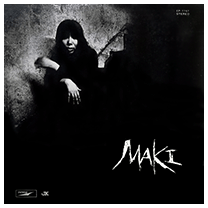 Maki Asakawa "Asakawa Maki No Sekai" (Toshiba/Express Records, 1970) (LP)
Maki Asakawa "Asakawa Maki No Sekai" (Toshiba/Express Records, 1970) (LP)
(Produced by Kei Terazawa)
A cool, hip, husky-voiced jazz chanteuse from Ishikawa, Maki Asakawa (1942-2010) got her start performing at American military bases during the 1960s, then became involved in Japan's countercultural art scene towards the decade's end. She made her recording debut on this brooding, moody album, which is mostly made up of her own songs, with a hefty chunk of the lyrics co-written with influential poet-playwright Shuji Terayama. It includes the hit, "Kamome," which became a cultural anthem, as well as the bluesy "Yo Ga Aketara," a discursive ballad which kicks the album off on a smoky, almost Marlene Dietrich-like mood. The first side of the album was recorded in the studio, while the second side was recorded live at the Theatre Scorpio ("Sasoriza") an avant-garde Tokyo movie house which doubled as a live performance space for music and theater, and as a meeting space for late 'Sixties student radicals. This is a groovy record... although it's a bit distant from the rock music we're looking at here, it's worth mentioning since it was a very popular, influential recording. Plus, she was hella cool, in a beatnik kinda way.
Maki Asakawa "Maki II" (Toshiba/Express Records, 1971) (LP)
Maki Asakawa "Live" (Toshiba/Express Records, 1972) (LP)
Maki Asakawa "Blue Spirit Blues" (Toshiba/Express Records, 1972) (LP)
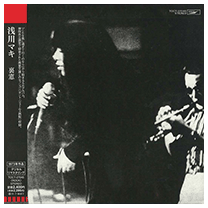 Maki Asakawa "Uramado" (Toshiba/Express Records, 1973) (LP)
Maki Asakawa "Uramado" (Toshiba/Express Records, 1973) (LP)
(Produced by Yukiko Sekine, Yoko Tamura, Koji Teramoto & Hiromisou Yakuo)
This album opens with the spectacularly catchy pop tune, "Konna Fu Ni Sugite Iku No Nara," ("If This Is What Happens") a discreet, self-contained gem that was a highlight of the archival folk-rock compilation, Even A Tree Can Shed Tears. (See below for more information about that album, which is a magical, essential collector-nerd touchstone.) That one track proves to have been an outlier on this album, which soon shows Maki Asakawa reverting to her jazz-blues roots, with material which I acknowledge is good stuff, just not what I'm interested in. The album ends with one other gentle, folk-poppish number, "Kentaurosu No Komori-Uta," ("Centaur Lullaby") which could be added to our folk-rock playlist, though it's not nearly as distinctive an arrangement. This is about as far as I need to go with Asakawa's ouvre though I'm sure her other albums are rewarding as well. It's refreshing to hear a jazz musician of this era delving into older, New Orleans-style jazz, complete with Louis Armstrong-ish trumpet and whatnot and resisting the pull of the then-cool jazz fusion trend, though Asakawa's hints of a Marianne Faithfull/Joni Mitchell level of torchsong experimentalism are tantalizing.
Maki Asakawa "Maki VI" (Toshiba/Express Records, 1974) (LP)
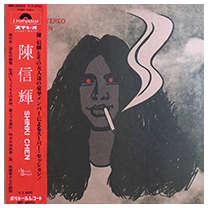 Shinki Chen "...And His Friends" (Polydor-Japan, 1971) (LP)
Shinki Chen "...And His Friends" (Polydor-Japan, 1971) (LP)
(Produced by Shinki Chen, Kinichiro Maeda & Ikuzo Orita)
A challenging, hippie-era rock guitarist often compared to Jimi Hendrix, Shinki Chen played in numerous bands, notably short-lived acts such as Powerhouse and Food Brain (which preceded this album), the gimmicky classical-meets-psychedelic Mannheim Rock Ensemble, and his own groups, including one called Speed, Glue & Shinki, which put out an album in 1970. Although he seems to have done some less-glamorous for-hire studio work (like the Mannheim fiasco) Shinki Chen also pursued a lot of aggressively avant trends, including this album, which was genuinely trippy and experimental. This group included Chen on guitar, along with Shinichi Nogi (drums), George Yanagi (bass and vocals) and Hiro Yanagida on keyboards. Most of the songs were credited to Shinki Chen, though singer George Yanagi also wrote several tracks.
Cornelius "First Question Award" (Trattoria/MSI Records, 1994)
Cornelius "69/96" (Trattoria Records, 1995)
Cornelius "96/69" (Trattoria Records, 1996)
A remix disc...
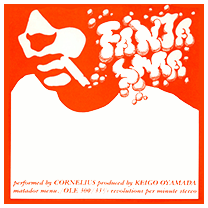 Cornelius "Fantasma" (Trattoria/Matador Records, 1997)
Cornelius "Fantasma" (Trattoria/Matador Records, 1997)
(Produced by Keigo Oyamada)
Cheery, kaleidoscopic, mix'n'match, big beat bounce-a-tronica from this beloved Japanese studio wizard and DJ turntablulist, whose given name is Keigo Oyamada, formerly of the band Flipper's Guitar. This album is bombastic and catchy, but may feel a little one-dimensional and gimmicky after a few auditions. Although he hit big with the electronica crowd, this disc has plenty of electric guitars, used both as attractive plumage and as an ironic nod towards the pop music "past." Plenty of folks in the know consider this an indiepop classic, but even if it doesn't ultimately enter your Top Ten list (or whatever) it's still a pretty fun disc.
Cornelius/Various Artists "FM" (Trattoria Records, 1998)
Several artists remix the Fantasma album... if you're into that kind of thing. Or were, back in the 'Nineties.
Cornelius/Various Artists "CM" (Trattoria Records, 1998)
...and Cornelius remixes their remixes...
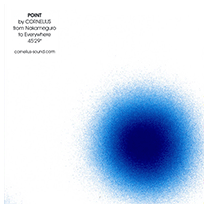 Cornelius "Point: From Nakameguro To Everywhere" (Matador Records, 2002)
Cornelius "Point: From Nakameguro To Everywhere" (Matador Records, 2002)
(Produced by Keigo Oyamada & Toyoaki Mishima)
Here Oyamada veers away from the deliberate vapidity of 1998's Fantasma into calmer, more subtle terrain -- personally, I find this a lot more engaging and substantive its predecessor. It's jittery and mildly irritating, though not overly cluttered, opening with a dreamy, repetitive patch of pop-ambient froth worthy of Kraftwerk, then nimbly drifts from genre to genre. Cornelius touches on clockwork-y King Crimson-style angularities, mellow, multi-textured cricket-and-bird laced exotica (ala Martin Denny), a momentary lapse into screeching, guitar-based grindcore, and caps the album off with a majestically synthetic rendition of Ary Barroso's samba classic, "Brazil," the most widely recorded song in the world. Odd but engaging; this holds up to repeated auditions, particularly with the lights low and the headphones on.
Cornelius "PM" (Pryaid Records, 2003)
Cornelius "CM2" (Matador Records, 2003)
More remixes!
Cornelius "Sensuous" (Warner-Japan/Everloving Records, 2007)
Creation "Creation" (Express Records, 1975) (LP)
(Produced by Kei Ishizaka, Yutaka Tomioka & Yuya Uchida)
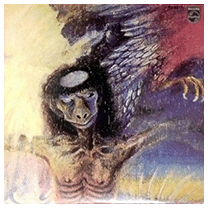 Miki Curtis & Samurai "Kappa" (Philips Records, 1971) (LP)
Miki Curtis & Samurai "Kappa" (Philips Records, 1971) (LP)
(Produced by Miki Curtis & Samurai)
Singer/producer Miki Curtis was an early Japanese rockabilly star from the 1950s who was dabbling in freaky blues-rock/funk-prog on this spacey freeform set, backed by the acid rock band Samurai, which seems to have been a confederation of Japanese and British rock musicians, including Miki Curtis, along with Joe Dunnett (guitar), Yujin Harada (drums), John Redfern (organ) and bassist Tetsu Yamauchi. Personally I find this blaring set slightly over-indulgent, and maybe even a bit kitschy, but it's still pretty solid for the style. Not my cup of tea, but folks looking for international examples of fuzzed-out heavy rock in the post-Blue Cheer/Iron Butterfly/Sabbath mode might want to give this a spin
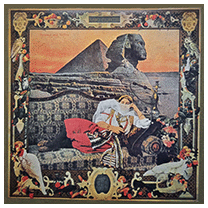 Miki Curtis "The First Ear" (Vertigo Records, 1972) (LP)
Miki Curtis "The First Ear" (Vertigo Records, 1972) (LP)
(Produced by Miki Curtis, Masaharu Honjo & Norio Yoshizawa)
A weird album, with some cool stuff, and some really kitschy bits as well. It veers from spaghetti western-ish orchestral pop to folkier themes, as well as some genuinely satisfying country-rock (notably on the song "The Sun Goes Down Again.") It's worth noting that this is much, much mellower than the album with Samurai that preceded it... Also some of the sleek, synth-driven passages seem to anticipate the softer, jazzier grooves of the "city pop" style that took hold several years later. A lot of this is too pop and twee for me, but it definitely underscores Miki Curtis's wide stylistic range, and even a legitimately experimental edge, notably on the oddball, English-language "Forty Days On A Stoned-Out Camel," a truly goofy, vaguely-Arabic novelty number that sounds like something Spinal Tap would have performed atop a scale-model pyramid. (And who knows? Maybe they did!) I enjoyed bits and pieces of this, but it's mostly not something I would listen to just for fun.
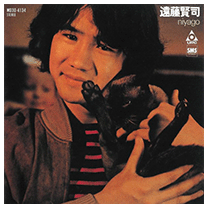 Kenji Endo "Niyago" (URC Records, 1970) (LP)
Kenji Endo "Niyago" (URC Records, 1970) (LP)
This one's kind of a hoot: on his debut album, folk singer Kenji Endo was straight-up doing a Japanese-language imitation of Donovan, both in his intonations and emotive, quavering vocal phrasings, as well as the musical arrangements, which mimic many of Donovan's iconic pop hits. It's kitschy, but also good. I dunno who played on this album, but doubtless a lot of figures central to the early 'Seventies folk-rock scene were present. Definitely worth a spin!
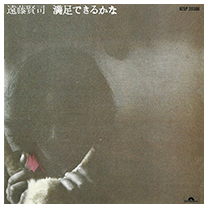 Kenji Endo "Manzoku Dekiru Ka Na" (Polydor Records, 1971) (LP)
Kenji Endo "Manzoku Dekiru Ka Na" (Polydor Records, 1971) (LP)
An even better, and perhaps more essential album than his debut disc above. This still shows traces of his Dylan-wannabee-Donovan roots, but Endo's own distinctive voice is steadily emerging as well. The album opens with a brash, only slightly-jarring Dylanesque oldies-rock number but soon shifts into a mellower, more contemplative groove. The album's second track, "Kareraisu" ("Curry Rice") is one of the more recognizable songs on the Even A Tree compilation -- a very good sign indeed! A very engaging album, with Enzo sounding less derivative and more like his own unique, quirky artistic persona is emerging. Recommended, though maybe there's a little too much harmonica.
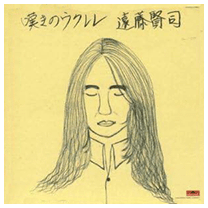 Kenji Endo "Nageki No Ukurere" (Polydor Records, 1972) (LP)
Kenji Endo "Nageki No Ukurere" (Polydor Records, 1972) (LP)
Alas, after refining one of the sweeter-sounding styles in the Japanese folk-pop sphere, a restless Endo for some reason felt a need to shake things up, and pursued a more dynamic, some might say frantic approach. He's yelling now; trying to toughen up his act and sound more emotive and impassioned and more "rock'n'roll." There some slight anticipation of punk rock abandon here, and some of the Greenwich Villages folkies in America tried similar paths (Keith Sykes' 1970 album, 1-2-3 comes to mind) or perhaps later on, 'Eighties post-punk folk-rockers like Camper Van Beethoven, or Carmaig Deforest, but it's a fine line to tread. I get the impulse, but here the results are often irritating and unattractive. Oh, well.
Kenji Endo "Kanki No Uta" (Polydor Records, 1973) (LP)
(Produced by Shohei Kaneko & Yasunori Kitijama)
Kenji Endo "Kenji" (Polydor Records, 1974) (LP)
Kenji Endo "Hard Folk Kenji" (CBS Records, 1975) (LP)
Kenji Endo "Tokyo Wasshoi" (Bellwood Records, 1978) (LP)
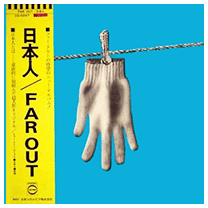 Far Out "Nihonjin" (Denon Records, 1973) (LP)
Far Out "Nihonjin" (Denon Records, 1973) (LP)
(Produced by Fumio Miyashita & Yuki Ogawa)
Starry-eyed, windswept space-rock prog from a band led by multi-instrumentalist and new age pioneer Fumio Miyashita, who soon changed the lineup and transformed this group into the Far East Family Band (which I'm un-alphabetically listing below, just for simplicities sake.) He's joined here by drummer Manami Arai, bassist Kei Ishikawa, and lead guitar player Eiichi Sayu on two album-side length tracks, each "totally epic" and, well, maybe a bit much. I mean, if you're into this particular version of psychedelic rock, well, sure: epic it is, then. But it's too wanky, pompous and self-indulgent for me. Nonetheless, it's genuinely still a rock-based thing at this point; later it would just be straight-up easy listening. Some epically terrible sitar playing on here, too -- like if Ritchie Blackmore randomly picked one up and started bashing away on it. Not my cup of twig tea.
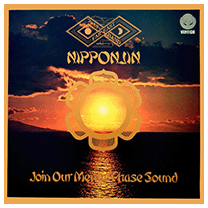 Far East Family Band "Nipponjin: Join Our Mental Phase Sound" (Vertigo Records, 1975) (LP)
Far East Family Band "Nipponjin: Join Our Mental Phase Sound" (Vertigo Records, 1975) (LP)
(Produced by Yoshio Mitsuo, Fumio Miyashita & Klaus Schulze)
The first record by the new lineup of this cosmically-oriented psychedelic/prog band. The band's founder Fumio Miyashita went on to me a major figure in the "new age" music scene... as did this album's keyboardist Masanori Takahashi (who later adopted the stage name Kitaro...) The full lineup consisted of Akira Fukakusa, Akira Ito, Fumio Miyashita, Hirohito Fukushima, Masanori Takahashi, Shizuo Takasaki, Yujin Harada, and they played a pretty mellow brand of long, grandiose, spacey jams, built around cosmic rock guitar... This is getting me a little far afield musically, but it's technically still rock music, sort of. I guess.
Far East Family Band "The Cave: Down To The Earth" (Mu Land Records, 1975) (LP)
Far East Family Band "Parallel World" (Mu Land Records, 1976) (LP)
Far East Family Band "Tenkujin" (Mu Land Records, 1977) (LP)
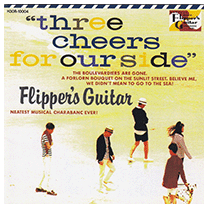 Flipper's Guitar "Three Cheers For Our Side!" (Polystar/3D Records, 1989)
Flipper's Guitar "Three Cheers For Our Side!" (Polystar/3D Records, 1989)
A pioneering Japanese indiepop band, Flipper's Guitar first formed in 1987 as leaders of the giddy, kitsch-friendly Shibuya-kei sound, part of a vibrant musical scene centered in Tokyo's super-hip Shibuya district. The band fused -- or edited together -- disparate elements of power-pop, acid jazz, spy jazz, easy listening, contemporary dance and hip-hop music. The driving force was the duo of Kenji Ozawa and Keigo Oyamada (who later went by the club name of Cornelius), who both went solo after Flipper's Guitar dissolved in 1991. Still a work in progress on this debut disc, the band's manic brand of cut-and-paste sampling borrowed from a similar aesthetic in American hip-hop, but dug deeper into more kitschy, frivolous material, imbuing their records with an upbeat sense of silliness and fun. Here, although there are synthy hints of a more expansive sound to come, the music is more basic, organically produced guitar-band rock, very much in line with the contemporary jangle-pop sounds of Scottish indierock and the English C86 scene, with a few knowing nods towards the B-52s and earlier American new wave bands. Both Ozawa and Oyamada had successful solo trajectories, with Oyamada taking on the persona of Cornelius, and releasing several albums through the American-based Matador label which placed him (as well as the band Pizzicato Five) in the middle of the college radio and indie-pop scene during the late 'Nineties and early 2000s.
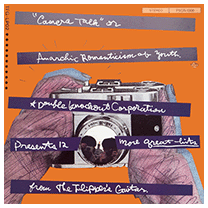 Flipper's Guitar "Camera Talk" (Polystar Records, 1990)
Flipper's Guitar "Camera Talk" (Polystar Records, 1990)
(Produced by Steve Williams & Zin Yoshida)
In contrast to the relatively two-dimensional jangle-core pop-rock of Flipper's Guitar's debut album, a more expansive mix'n'match, cut-and-paste Shibuya-kei superpop aesthetic emerges on this sophomore set, which opens with plenty of synths and amped-up drum machine BPMs, and an overall sense of uncontrollable giddiness -- a breezy, summery feel more in line with their later projects. Co-producer Steve Williams apparently had a long career dating back to some fairly mundane stuff in the late 'Seventies, but is more favorably and indie-credibly remembered for working with The Smiths, Morrissey and Squeeze, though I'm not sure how much of that is reflected in how this albums sounds... Anyway, there's a little something for everyone: it's partly super groovy, though also kind of annoying. Depends on your personal preferences. Oddly, I found the more techno-poppy tracks at the start to be more compelling, and the backwards dips into guitar rock a little regressive. Definitely worth a spin, though.
Flipper's Guitar "Doctor Head's World Tower" (1991)
(Produced by Kenichi Makimura, Toru Takayama & Zin Yoshida)
Flipper's Guitar "On Pleasure Bent" (1992)
A live album...
Flipper's Guitar "Colour Me Pop" (1991)
Flipper's Guitar "Singles" (1992)
Flipper's Guitar "Treasure Collection" (2000)
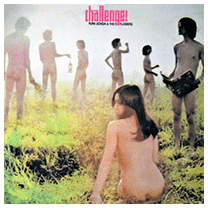 (Yuya Uchida &) The Flowers "Challenge!" (Columbia Records, 1969) (LP)
(Yuya Uchida &) The Flowers "Challenge!" (Columbia Records, 1969) (LP)
(Produced by Yuya Uchida)
The lone album by The Flowers, a Japanese psych band put together by producer Yuya Uchida, who famously befriended John Lennon when he opened for the Beatles on their 1966 Japanese tour, then made trips to San Francisco and London to learn more about the psychedelic music scene. He then masterminded several successful rock bands, including this group, mostly a cover act which he nominally led, backed by guitarist Remi Aso, Hiroshi Chiba (vocals), Takeshi Hashimoto (bass), Katsuhiko Kobayashi (steel guitar), Kento Nakamura (vocals), and drummer Joji Wada -- and its immediate reincarnation as heavy metal-ish Flower Travellin' Band, which became an internationally successful stadium rock act. Although there's one Japanese original ("Hidariashi No Otoko") on here, it's mostly covers of hippie rock classics like "Stone Free," "Hey Joe," "I'm So Glad," "White Room" and "Piece Of My Heart," etc. (BTW, the front cover theme of oh-so-naughty nudity was continued on the first Flower Travellin' Band album, which came out the following year...)
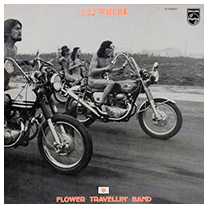 Flower Travellin' Band "Anywhere" (Philips-Japan, 1970) (LP)
Flower Travellin' Band "Anywhere" (Philips-Japan, 1970) (LP)
(Produced by Yuya Uchida, Tatsuo Umeda, Tadataka Watanabe & Norio Yoshizawa)
The first album from a hard-rock band made up refugee ex-members of various earlier Japanese psych-roch bands, notably drummer Joji (George) Wada from The Flowers (which lent its name to this this group) as well as Hideki Ishima (guitar), Jun Kobayashi (bass) and lead singer Joe Yamanaka, who all posed on the album cover riding motorcycles in the buff: still nude, but riding choppers instead of wandering around stoned in a meadow with some naked girl... very hardcore! This album features some pretty heavy blues rock and proto-metal, with a distinct Southern Rock flavor... They cover the Animals, Black Sabbath and the Kinks, but who you'll really hear in this mix are American rockers like The Allman Brothers, MC5 and The Edgar Winter Band. The English-language vocals are a mild shortcoming, but they pull their weight on epic guitar jams like "Louisiana Blues." It's not really my cup of tea, but respect where respect is due: these guys dug pretty deep into the contemporary American scene. Apparently after this album was recorded they relocated to Canada for about a year and a half, returning to Japan in early 1972.
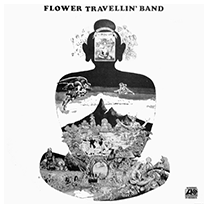 Flower Travellin' Band "Satori" (Atlantic Records, 1971) (LP)
Flower Travellin' Band "Satori" (Atlantic Records, 1971) (LP)
(Produced by Yuya Uchida, Ikuzo Orita & Norio Yoshizawa)
Again, not my kinda rock music, but nonetheless this is a pretty badass record, and very, very challenging, even to modern-day listeners. A concept album of sorts, with five long, grinding guitar rock tracks -- "Satori," parts one through five -- that have a very confrontational, in-your-face vibe. Although the guitars and vocals are clearly anchored in the Black Sabbath/Ozzy ethos, the tracks have an avant-garde overtone that places this album as a direct ancestor of Japanoise and difficult listening bands of the '80s and '90s, such as the Boredoms and their kin. To the extent it's still anchored in the mundane world of early 'Seventies hard rock, there's also a similarity to some of the more aggressive American and English bands of era -- Bowie, Johnny Thunders, Lou Reed, MC5, et.al. who were straining at the confines, edges, and conventions of the times, trying to catch a glimpse of the punk rock breakthroughs to come. Again, I'm wimpy and old and not likely to play this stuff at home for fun, but if you're into difficult music, I strongly recommend you give this one a spin.
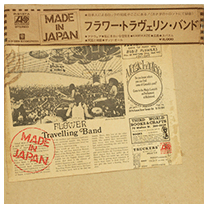 Flower Travellin' Band "Made In Japan" (Atlantic Records, 1972) (LP)
Flower Travellin' Band "Made In Japan" (Atlantic Records, 1972) (LP)
(Produced by Paul Hoffert, Gilbert Kong, Ikuzo Orita & Yuya Uchida)
A souvenir of their year-and-a-half in Canada, this is more of a commercially viable album, certainly, than Satori, and more in line with the grandiose pretensions of early '70s heavy metal, Black Sabbath in particular. There are a few proggy and avant touches, but for the most part this is pretty solidly inside the mainstream of a certain brand of hard-edged, post-hippie arena rock. Indeed, the album hilariously opens with a pirated radio ad for a concert they did alongside Emerson, Lake & Palmer and Bob Seger at Toronto's now-defunct Stanley Park Stadium... with Flower Travellin' Band getting second billing after ELP(!) Additionally, the cover art reproduces a page from a free-press newspaper review of the band, further emphasizing their successful embedment in the North American counterculture. Although they were working with a few Canadian producers, the Travellin' Band was playing all their own music, and seemed pretty in charge of their image and direction. Still not my cup of matcha, but I get it.
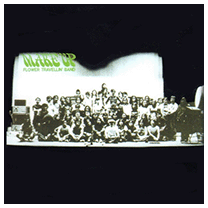 Flower Travellin' Band "Make Up" (Atlantic Records, 1973) (LP)
Flower Travellin' Band "Make Up" (Atlantic Records, 1973) (LP)
They got weird again. This is kind of like, I dunno, if Ozzy Osbourne joined Yes? Or toured with Bowie? Although all the early metal stylizations are still present, there's a lot of wild changes in tempo and tone -- given the album title and the fact that it was originally packaged inside an actual leather bag(!) I'd guess this was meant to be their foray into glam rock, or something reasonably adjacent. Anyway, it's challenging but also really kinda cool... Might appeal to fans of Arthur Brown's Kingdom Come, or maybe even early Sparks. For my money, this is their best and most rewarding album. Recommended.
Flower Travellin' Band "We Are Here" (Pony Canyon Records, 2008)
(Produced by Flower Travellin' Band, Sadayuki Kurawaka & Masahiro Terada)
A absolutely dreadful reunion album with a bland production style that is way too glossy and '80s-ed out for me. I lived through this kind of bloodless, prefab pop-rock sound when it was new, don't need to revisit it now. Blechh.
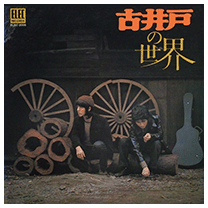 Fluid "Koito No Sekai" (Elec Records, 1972) (LP)
Fluid "Koito No Sekai" (Elec Records, 1972) (LP)
(Produced by Isamu Asanuma & Kazuo Kobayashi)
This was, I think, the first full album by the folk-psych group Fluid, which was active throughout the the 'Seventies, from 1971-79, with members including Yoshitaro Kanazaki, Mitsuhiro Okutsu and Nakaido Reichi. This set oscillates between pretty stripped down, primarily acoustic tunes and a few more complex tracks, with impassioned vocals a rock music underpinning, and a generally repetitive feel throughout the course of the album. A lot of it can considered a bit too twee or overly emotive, but some tracks transcend the band's initial limitations -- the contemplative, morose "Rokudenashi" which was featured on the Even A Tree Can Shed Tears collection, the musicbox-ish "Taikutsu" and the uptempo, rock-flavored "Kogane mushi" are standouts, though overall, if I'm being honest, a lot of this album is fairly tedious.
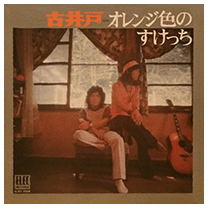 Fluid "Orenji-Iro No Suke Tchi" (Elec Records, 1972) (LP)
Fluid "Orenji-Iro No Suke Tchi" (Elec Records, 1972) (LP)
(Produced by Isamu Asanuma & Kazuo Kobayashi)
This sounds a lot like their debut album: stripped-down, mostly-acoustic, kinda dorky folk-pop ditties performed in a thematically repetitive style, notably defined by morose, leaden, often monotonous vocals. Some songs are punctuated by attempts to spice things up, most often by the lead singer shouting the lyrics rather than muttering them, or with various novelty musical touches, though even these are often undercut by the annoying vocals. The electrified psych-rock arrangement on the uptempo "Oshogatsuda Yo" is a good example: it's a passable folk-rock tune, somewhere in the same general range as early Country Joe & The Fish, perhaps, but while the music sounds fine, the singer is again a real buzzkill. Also, they were just so darn stylistically limited: I felt like maybe this was a repeat or even a re-recording of the previous album, with some piano and mandolin added to provide some slight contrast. I don't mean to offend anyone, but there was very little on here that held my attention, or felt like something I'd want to playlist and listen to again.
Fluid/Various Artists "UTA NO ICHI KUMIYOKO: OTOKO, OTOKO, OTOKO" (Victor Records, 1972) (LP)
This folk-rock concert album came out in early 1972, the same year as Fluid's first two albums, although I'm not sure if it preceded them. I'm also not sure how many songs are by Fluid, or which tracks are theirs. The other artists were Keitaro Ikuta and Kenichi Nagira
Fluid "Third Album" (Elec Records, 1973) (LP)
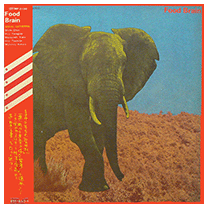 Food Brain "Social Gathering" (Polydor Records, 1970) (LP)
Food Brain "Social Gathering" (Polydor Records, 1970) (LP)
(Produced by Shinki Chen, Katsuyuki Handa, Kinichiro Maeda, Kuzo Ovita, Mick Tachikawa & Hiro Yanagida)
Uhhh... Great band name, kind of, but this might be something of an acquired taste. Something of a hard-rock supergroup, Food Brain was a one-off project featuring electric guitarist Shinki Chen, bassist Masayoshi Kabe, drummer Hiro Tsunoda and keyboardist Hiro Yanagida, all pushing as hard as they can on a set of extended, super-aggressive rock-jazz jams. The opening track is awful. The rest of the record provides more texture and there are some genuinely cool passages, particularly Masayoshi Kabe's fuzzed-out bass work and Hiro Tsunoda's consistently high-powered drumming. This is justifiably considered an "experimental" rock album, though "taxing" might be an equally apt description. Depends on your point of view. I found both Shinki Chen's piercing guitar solos and Hiro Yanagida's endlessly intrusive keyboard riffs to be overly dominant and annoying, which of course isn't surprising, since both instruments were highly prized and central to the early 'Seventies rock world. But it does get old quick. That being said, this was a potent quartet, and you can understand why this record has remained in print over the decades and why fans of psych-rock, prog-fusion and free jazz keep coming back to it. I'm too old for this stuff, but I get it.
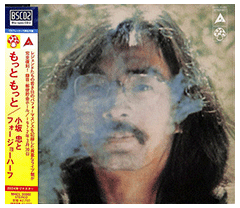 Four Joe Half "Farther Longer/Motto Motto" (Denon Records, 1972) (LP)
Four Joe Half "Farther Longer/Motto Motto" (Denon Records, 1972) (LP)
Though officially billed as a solo album by singer Chu Kosaka, formerly of the psych-rock band Apryl Fool, this is also the lone contemporary release by Four Joe Half, one of Japan's most accomplished and twangiest country-rock bands. This lineup also featured steel player Hiroki Komazawa, whose concise, evocative licks gave a clear definition to their sound, which had an overall Little Feat-like or Flying Burrito Brothers vibe. The original Japanese title is a repetition of the word "motto," which has multiple meanings -- you could translate this as "More, More," though I think "Farther Longer" has a nicer ring.
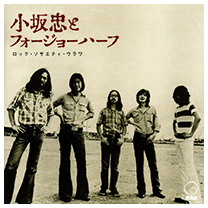 Four Joe Half "Urawa Rock Society 1972 Summer Camp" (Fuji Records, 2020) (LP)
Four Joe Half "Urawa Rock Society 1972 Summer Camp" (Fuji Records, 2020) (LP)
Recommended! This appears to be an archival live recording of the Japanese country-rock band Four Joe Half, which included lead singer Chu Kosaka, steel player Hiroki Komazawa and others, in a languid set that has a dreamy, Grateful Dead-meets-Burrito Brothers feel. The tempo is a little unvarying, and taken as a whole this album could get a little monotonous, although each individual track is pretty sweet. A strong entry into the historical Japanese 'Seventies country-rock canon... As far as I can tell this was a concert performance (possibly recorded as part of a Woodstock-like concert film) that sat in the vaults until several decades later. [Note: the "title" above is just something I slathered together using Google Translate... I welcome corrections, if they are required.]
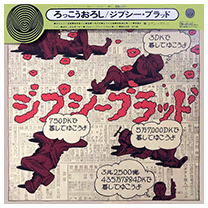 Gypsy Blood "Rokko Oroshi" (Vertigo Records, 1972) (LP)
Gypsy Blood "Rokko Oroshi" (Vertigo Records, 1972) (LP)
(Produced by Miki Curtis & Toshio Kobayshi)
A super-cool country-rock set from a Japanese combo with a nice, easygoing groove, sort of a mix between Eagles-style SoCal soft-rock twang and spacey Grateful Dead-ish jam-band rock... but better and far less irritating that either of those comparisons might imply. This was the band's only full album, with core members Shinichi Fujii (bass), Kiyoshi Hayami (guitar and mandolin), Mitsuo Nagai (guitar), Hiroaki Nakamura (guitar), and drummer Eiichi Tsukasa, joined by Alan Merrill on piano and Katsuo Ohno on organ. (Sadly, the pedal steel player appears to have been unidentified, although they were pretty decent.) Also noteworthy is producer Miki Curtis, an early Japanese rockabilly star from the 1950s who was dabbling in freaky acid-funk on his own albums around the time he helmed this set. Anyway, this is a pretty groovy album, with a genuine country vibe that also fits in with my Asian Twang recommendations.
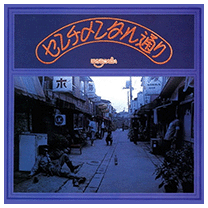 Hachimitsupai "Senchimentaru-Dori/Sentimental Street" (Bellwood Records, 1973) (LP)
Hachimitsupai "Senchimentaru-Dori/Sentimental Street" (Bellwood Records, 1973) (LP)
A gloriously languid, flowery country-folk set from this pioneering rural rock band, which had one track, "Heinouede," included on the super-fab Even A Tree Can Shed Tears compilation. Hachimitsupai was originally formed in 1971 as a backing band for folk-rock pioneer Morio Agata, and recorded this lone "solo" album before breaking up in '74. This is a super-cool record, built on baroque-folk arrangements, but also plenty of rootsy overtones, including Jerry Garcia-ish pedal steel, sweet violin and a heavy, thumping downbeat which makes many of these tracks feel similar to contemporary recordings by The Band. The keening, wistful male vocals and declarative, guiding piano also lend a Carole King-ish feel to this album... It's pretty cosmic and grandiose, but in a nice way. This was the group's only hippie-era, early 'Seventies album, though they recorded others after a 1988 reunion. Really quite lovely, and highly recommended. Their work with Morio Agata is pretty cool, too.
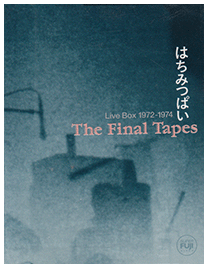 Hachimitsupai "The Final Tapes: Live Box 1972-1974" (Super Fuji Discs, 2009) (LP)
Hachimitsupai "The Final Tapes: Live Box 1972-1974" (Super Fuji Discs, 2009) (LP)
Hey, if you're looking for something to get me for my birthday, this nine-CD box set collecting the bulk of Hachimitsupai's 1970's output would be sure to bring a smile. I'm not even sure what all is on here, but it looks like it combines several live shows, maybe some demos and, gosh, who knows what else. It sticks to their early years, recorded between 1972-74, and does not also span forward into the later recorded in the '80s, '90s, and beyond. Sounds groovy to me!
 Happy End "Happiendo/Happy End" (URC Records, 1970) (LP)
Happy End "Happiendo/Happy End" (URC Records, 1970) (LP)
(Produced by Masaaki Hata)
 Happy End "Kazemachiroman" (URC Records, 1971) (LP)
Happy End "Kazemachiroman" (URC Records, 1971) (LP)
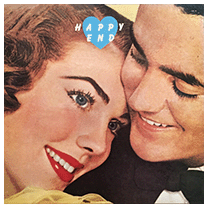 Happy End "Happy End" (Bellwood Records, 1973) (LP)
Happy End "Happy End" (Bellwood Records, 1973) (LP)
Not to be confused with their other self-titled album above, this found Happy End's core members -- Haruomi Hosono (bass, guitar, mandolin and piano), Takashi Masumoto (drums), Eiichi Ohtaki (acoustic guitar), Shigeru Suzuki (guitar) -- traveling to Los Angeles to collaborate with a small cadre of top-end studio players. With the band credited as arranger/producers, Happy End found a happy medium in this set, making the most of the slick professional accompaniment provided by the likes of Van Dyke Parks (organ and piano), Lowell George (slide guitar), Bill Payne (piano), Tom Scott (saxophone), and a couple of Wrecking Crew horn players. A nice, gentle album curiously accentuated with the sort of slick, mid-1970s touches you'd hear on contemporary albums by Joni Mitchell or LA Express. This definitely has the pastoral folkie feel of their best work, at least the first third of the album does... after that it gets a bit muddled, though the initial tracks hold up well.
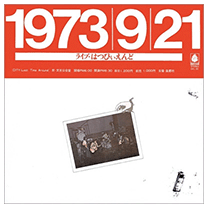 Happy End "Raivu!/Live! Happy End, 1973.9.21" (Bellwood Records, 1974) (LP)
Happy End "Raivu!/Live! Happy End, 1973.9.21" (Bellwood Records, 1974) (LP)
Though the band had officially broken up in '73 (only to reunite a few times in years to come) this live set was a nice bookend to their early years... There's a loose, groovy funk feel to a lot of this, but also a lackadaisical jam-band vibe, not unlike the Grateful Dead, if we're being honest. It's historically interesting, though it might not be everyone's cup of tea. I could tolerate it, but it didn't really grab my imagination... Worth a spin, I suppose, but maybe a little too spaced-out overall.
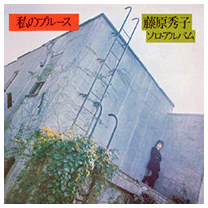 Fujiwara Hideko "Watashi No Burusu/My Blues" (URC Records, 1970) (LP)
Fujiwara Hideko "Watashi No Burusu/My Blues" (URC Records, 1970) (LP)
(Produced by Masaaki Hata)
Although I've learned that a bunch of "the good stuff" came out on the URC label, I'd have to say this particular album seems a bit marginal on the quest for hidden Japanese rock gems, though perhaps it's of interest to loungecore devotees. Gal singer Fujiwara Hideko (1946-2016) sang in a prolific group called Itsutsu No Akai Fusen ("Five Red Balloons") along with folk singer Takashi Nishioka. This appears to have been Hideko's only solo album, and finds her working in an intriguing pop vocals/chanson mode; fans of Petula Clark or Dusty Springfield might dig these lavishly orchestrated jazz-blues tunes, which are replete with vibraphone, brass and strings, as well as some faux-hippie rock guitar which, in my opinion, seems a bit lackadaisical and gratuitous. I don't doubt the "authenticity" of the musicians involved, but this sounds like innumerable mainstream pop albums of the era where the rock elements are studio-producer affectations more than integral elements of the arrangements... It's really in the ear of the beholder, I guess. Anyway, this is livelier than a lot of the snoozy Japanese pop and pop vocals of the time, though still kind of dreary. It didn't really grab me, but I can see the appeal.
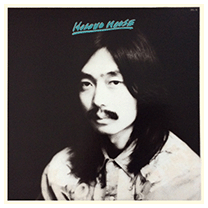 Haruomi Hosono "Hosono House" (King Records-Japan, 1973) (LP)
Haruomi Hosono "Hosono House" (King Records-Japan, 1973) (LP)
(Produced by Haruomi Hosono, Masaki Nomura & Kinji Yoshino)
This was the first solo album (I think) by Japanese pop chameleon Haruomi ("Harry") Hosono, a musician and producer best known as a co-founder of the late '70s/early '80s technopop band Yellow Magic Orchestra. Born in 1947, multi-instrumentalist Hosono had previously led the late 'Sixties psych band Apryl Fool, which transformed into the eclectic folk-rock/avant group Happy End. Happy End broke up in early 1973 after recording a few albums, and Hosono continued in that group's experimental direction on this album, which has an insouciant, puckish, almost Zappa-esque feel. I guess it's a stretch calling this a "country" record, though there are definitely some strong country vibes, largely courtesy of pedal steel player Hiroki Komazawa, who is showcased on a couple of tracks, including one where Hosono mumbles the phrase "country music" in English during the bridge... Also some gentle, folkish tunes, though most of the album is a little too rock-pop oriented for me, even with the kooky, oddball touches. The good tracks are quite good, though.
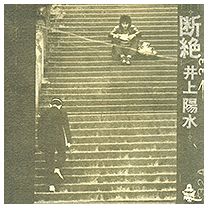 Yosui Inoue "Danzetsu" (Polydor Records, 1972) (LP)
Yosui Inoue "Danzetsu" (Polydor Records, 1972) (LP)
(Produced by Hidenori Taga)
Originally seen as an innovative folk-pop artist, Yosui Inoue started his career in 1969 using the pseudonym Andre Candre, but switched to a more Japanese-sounding name when he moved to the Polydor label. I can't speak to the poetic qualities of Inoue's lyrics, but the interwebs inform me that he was seen as an avatar of the feelings of anxiety and alienation that his younger fans felt in the late 1960s, and was celebrated as an artist who addressed these issues with more candor than was openly acceptable in mainstream Japanese society at that time. This acoustic-based debut seems a bit mannered, but has a genuinely haunting quality, sort of a romantic goth-gloominess, paired with occasionally melodramatic vocal flourishes, and a few forays into broader, larger pop-rock territory, with an almost Moody Blues-like feel. It doesn't really grab me, but I can see the appeal, especially given the staid parameters of mainstream Japanese pop at the time. The backing band included Jun Fukamachi (organ), Katsu Hoshi (guitar), Takao Kisugi (acoustic guitar), Tarao Miyuki (bass), Mikiharu Suzuki (drums) and Johnny Yamazaki (piano) with one notable feature being several different acoustic guitarists, Inoue among them.
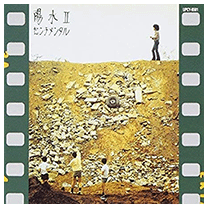 Yosui Inoue "Yosui II: Sentimental" (Polydor Records, 1973) (LP)
Yosui Inoue "Yosui II: Sentimental" (Polydor Records, 1973) (LP)
(Produced by Hidenori Taga)
Though there are still slower, contemplative numbers, Inoue is more clearly embracing a rock aesthetic, with kind of mixed results. Overall this feels more emphatic and emotive, and often a bit stilted and strained, but you can definitely imagine some sensitive, isolated youngsters holed up in their rooms, desperately clinging to these emo-infused tunes. Some of the softer tunes, like "Shiroi Carnation" feel a bit cloying, but there are some genuinely intriguing tracks, like the oddly arranged "Kankanderi," or the vaguely McCartneyesque "Adokenai Kimi No Shigusa" and it's poppy, almost showtunes-ish companion, "Kannaduki Ni Kakomarete."
Electropop historians might even appreciate tracks such as the synthy-but-gooey "Night Bus," though I personally have to confess this is an album I had to struggle to appreciate, and I didn't really feel I got that much out of it. I "get it," kind of, but it's not really my cup of tea. Similar lineup to his first album, with a few new players.
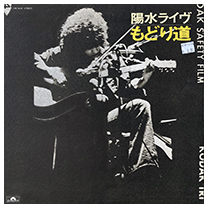 Yosui Inoue "Yosui Live" (Polydor Records, 1973) (LP)
Yosui Inoue "Yosui Live" (Polydor Records, 1973) (LP)
(Produced by Katsuya Amuro)
Strummy, emphatic acoustic folk-rock, recorded live At Kosei Nenkin Hall on April 14, 1973, with low-key, discursive stage banter and stripped-down solo guitar for much of the show, though Side Two does open with a big psychedelic rock blow-out, before returning to a mellower, quieter mode. Not mind-blowing, but immediate and sincere... kind of a Tim Hardin-like vibe. Worth a spin. The lineup is a more stripped-down edition of the studio that backed him on his first two albums, including most notably Hideaki Takebe on bass, guitarist Hiromi Yasuda, most notably keyboardist Jun Fukamachi, who played on all three albums; Fukamachi later went on to play in the jazz-fusion scene, including a late-'Seventies stint with the Brecker Brothers.
 Yosui Inoue "Kori No Sekai/Frozen World" (Polydor Records, 1973) (LP)
Yosui Inoue "Kori No Sekai/Frozen World" (Polydor Records, 1973) (LP)
(Produced by Katsuya Amuro)
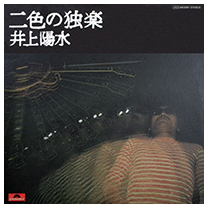 Yosui Inoue "Nishokunokoma" (Polydor Records, 1974) (LP)
Yosui Inoue "Nishokunokoma" (Polydor Records, 1974) (LP)
(Produced by Hidenori Taga, Jack Nitzsche & Henry Lewy)
For his fifth album, Inoue made a pilgrimage to Los Angeles and got the full California studio scene treatment, with producer/arranger Jack Nitzsche steering a bunch of usual-suspect Wrecking Crew types, including hyper-professionals such as Milt Holland (percussion), Larry Mahoberak (bass), Ray Parker Jr. (guitar), Joe Sample (keyboards), whose too-slick LA sound often lends an air of tackiness to Inoue's tunes -- terrible, tinny guitar solos, tight but trite horn arrangements, etc. The set blasts off with a manic hard-rock vibe which slowly but unevenly softens over the course of the album; mostly it's pretty overwrought and awful, including a few attempts to retreat into a mellower, pastoral folk-pop mode. There are also a few pickers from the country-rock scene like guitarist Jesse Ed Davis and steel player Red Rhodes, though their twang is mostly subsumed by Jack Nitzsche's larger machinations; you can hear them playing, but it doesn't feel very country. The only fun track on here is a bilingual power-pop anthem called "Happy Birthday," which has a punchy, Raspberries-ish feel... It's okay, but the album as a whole didn't really have anything on it that wowed me.
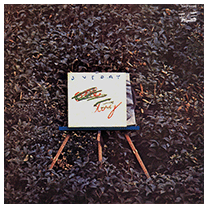 Hideki Ishima "One Day" (Propeller Records, 1973) (LP)
Hideki Ishima "One Day" (Propeller Records, 1973) (LP)
(Produced by Yoshio Mitsuo & Norio Okada)
The lone solo album from guitarist Hideki Ishima, who moved from the '60s group sounds garage bands the Beavers and the Outlaws into the '70s bad-boy hard-rock group Flower Travelling Band, and became known for his fascination with the sitar, and the creation of an electrified hybrid instrument he called the sitarla. A pretty trippy vibe on this one with unusually textured songs that have a surprisingly modern feel, presaging some of the post-punk new-wave records of the '80s. One notable track is a long jam called "Depending By The Time," which initially sounds somewhat like David Byrne's early semi-synthy solo work, but erupts into a 'Seventies glam groove that cuts into the mellowness like a velvety buzzsaw. The performances might be mostly from Ishima, although keyboardist Nobuhiko Shinohara (of The Flower Travellin' Band) adds some moody, funky accompaniment. Pretty cool.
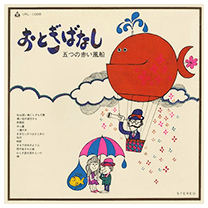 Itsutsu No Akai Fusen "Oto Gibanashi/Fairy Tale" (URC Records, 1969) (LP)
Itsutsu No Akai Fusen "Oto Gibanashi/Fairy Tale" (URC Records, 1969) (LP)
(Produced by Masaaki Hata)
This was the first album by the prolific, Nakagawa-based folk group Itsutsu No Akai Fusen ("Five Red Balloons") which was originally formed in 1967 and launched the career of solo artist Takashi Nishioka; other members included Junji Ariyama, Fujiwara Hideko, Isato Nakagawa; also on board for this album was bassist Hitoshi Tanino and drummer Tatasuke Kida. Though the lineup changed over the years, the band recorded numerous albums before disbanding in 1972... Two different revivals followed, one by a totally different group which called itself "Five Red Balloons-75" and by some of the original members who got back together in 1979. They had a pretty "square" sound relative to some of their more rock-oriented contemporaries -- although their Fifth Dimension/Peter, Paul & Mary-like harmony vocals sound was perhaps adventurous compared to the unending blandness of mainstream Japanese kayokyoku pop... They certainly seem to have been popular, given how prolific they were as recording artists. But even though they recoded for the legendarily groovy URC label, this is really pretty tame material.
Itsutsu No Akai Fusen/Wataru Takada "Takada Wataru/Itsutsu No Akai Fusen" (URC Records, 1970) (LP)
(Produced by Masaaki Hata, Kazuhiku Kato & Tomoyo Takaishi)
A live concert album, with Side One spotlighting Wataru Takada (1949-2005) a jokey, animated solo acoustic folk singer working in the classic Woody Guthrie/Bob Dylan tradition, although he messes with meter and jams a zillion words in, often ignoring the meter, or even bending away from the American blues meter into more Japanese melodic structure, while still strumming the same rhythm on guitar. The flipside, with Itsutsu No Akai Fusen, with their trademark cheerful, prim pop-folk harmony vocals, accentuated with slightly corny accompaniment on autoharp and vibraphone.
Itsutsu No Akai Fusen "In Concert" (URC Records, 1970) (LP)
Another live album, still sounding pretty square and Peter, Paul & Mary-ish. On Side Two, they get a little more expansive and experiment a little with some rock-oriented arrangements, even some with sort of a George Harrison-like vibe. Nothing earthshaking, but you can hear how they're edging into a more dynamic, more contemporary sound. The group recorded many more albums... I'll explore those more fully as time allows.
 Johnny, Louis & Char "Free Spirit" (See-Saw Records, 1979) (LP)
Johnny, Louis & Char "Free Spirit" (See-Saw Records, 1979) (LP)
A short-lived rock trio made up of Nobuki "Johnny" Yoshinaga (on drums), Masayoshi "Louie Louis" Kabe (bass) and Hisato "Char" Takenaka (guitar) who later called themselves Pink Cloud, from the early '80s onward. This set of guitar-heavy hard rock had a Joe Satriani-ish vibe, but overall it feels pointless and very out of date, and the English-language vocals don't really help much.. They had a bunch of other albums but I just can't bring myself to care.
 Julie "Julie" (Polydor Records, 1969) (LP)
Julie "Julie" (Polydor Records, 1969) (LP)
The first solo album from Kenji Sawada, lead singer of the rock-oriented "group sounds" band, The Tigers. They were kind a prefab, Monkees-like outfit, and part of their gimmick was that each of the members had a cute, boy-band nickname, with Sawada going by the curiously feminine monicker "Julie." Although the Tigers were officially a rock group, this set lands solidly in the more staid, downtempo pop genre known as "kayokyoku," or "Showa-era" pop -- a slower, mellower vocal style specifically meant to be sung along to... The album includes one mildly uptempo rock-pop tune, "Daremo Tomewa Shinai," as well as a couple of teenpop ballads that have a retro, late '50s Eisenhower/Kennedy-era feel, but mostly this falls into the flatter, blander, more muted confines of old-school Japanese pop. Julie had a nice voice, but this probably has a pretty limited appeal to folks outside of the culture.
Julie "Julie II" (Polydor Records, 1971) (LP)
(Produced by Anton Matthews)
Julie "Julie V: Nissei Recital" (Polydor Records, 1972) (LP)
A live double album recorded at the Nissei Theater in Tokyo. Notable for a bunch of rock and R&B oldies covers from the likes of Chuck Berry ("Johnny B. Goode"), Ray Charles ("What'd I Say"), The Box Tops ("The Letter"), The Beatles ("With A Little Help From My Friends") and the like. You know, "Blueberry Hill," "Shake, Rattle And Roll," "Long Tall Sally..." That kinda stuff, along with a fair amount of Japanese pop songs as well. Two newer covers include "I Believe In Music," which kicks the concert off, and John & Yoko's "Give Peace A Chance." Kenji Sawada recorded a ton of other albums, but I think there may be diminishing returns for rock fans, so I'll stop here for now.
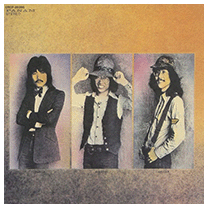 Kaguyahime "Kaguyahime 3" (Panam Records, 1973) (LP)
Kaguyahime "Kaguyahime 3" (Panam Records, 1973) (LP)
(Produced by Yutaka Goto, Ken-Ichi Matsuzawa & Tsuguo Sato)
Though considered more of a folk-rock band, the group called Kaguyahime definitely dipped into the waters of contemporary early 'Seventies country-rock, with light pleasant twang buoyed by fiddle, dobro and steel guitar. Sure, this is more in line with soft-rock bands such as America or The Little River Band... but it is that really such a bad thing? Though some of the arrangements can sound a little trite, overall this is a pretty pleasant album, and can also be appreciated by folks looking for some hippie-era Japanese folk-freak psychedelia. The band's main trio of guitarist Shozo Ise, singer Kosetsu Minami and bassist Panda Yamata are joined by a number of studio musicians, notably Takahiko Ishikawa on dobro and guitar, and Masahiro Takekawa playing violin... The group recorded several albums and seems to have been pretty popular, though I don't know how much twang may have been in their other albums; I know some of their later stuff (particularly their solo works) devolved into some pretty drab, slick pop. [Note: I have to apologize for making up the album title above: at least part of it was the band's name, but I couldn't find a translation of the rest of the text. But it does seem to have been their third album... So... close enough?]
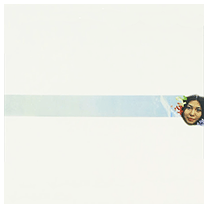 Sachiko Kanenobu "Misora/Sky" (URC Records, 1972) (LP)
Sachiko Kanenobu "Misora/Sky" (URC Records, 1972) (LP)
(Produced by Masaaki Hata & Kinji Yoshino)
A gorgeous, foundational album in Japan's early 'Seventies folk-rock scene. With one track featured on the Even A Tree compilation, and this entire album reissued by Light In The Attic, this is one of the most cohesive and magical of these hippie-era albums, with singer Sachiko Kanenobu playing 12-string guitar, backed by several luminaries of the URC label's core musicians, Haruomi Harono (on bass, guitar, organ and piano), Tasuo Haysahi (drums), and Isato Nakagawa adding some delicate, effective slide guitar. Ms. Kanenobu credits Scottish folkie Donovan as her primary influence, though doubtless you'll hear strong hints of Joni Mitchell in here as well, possibly because Kanenobu was a largely self-taught musician, and developed her own idiosyncratic sound, much like Joni Mitchell. She also has a pretty interesting biography: born in Osaka, Sachiko Kanenobu cut her first single as part of a short-lived group called Himitsu Kessha Marumaru Kyodan, then started to sink out of sight before being championed by Haruomi Harono, whose psych-folk group Happy End was pulling URC in a more experimental direction. The result was this album, which was certainly a URC high point. Shortly after its release, Kanenobu emigrated to the United States with her husband, rock critic Paul Williams, co-founder of the fabled Crawdaddy magazine, eventually settling in California, where she later recorded the albums below. This album, Misora, is a masterpiece, duly revered by folk-rock fans around the world. Including me!
Sachiko Kanenobu "Seize Fire" (LXR Records, 1991) (LP)
(Produced by Tom Mallon & Sachiko Kanenobu)
Sachiko Kanenobu "It's Up To You" (Midi Records, 1995) (LP)
Sachiko Kanenobu "Fork In The Road" (Seals Records, 1998) (LP)
Sachiko Kanenobu "Sachiko" (Victor Records, 1999) (LP)
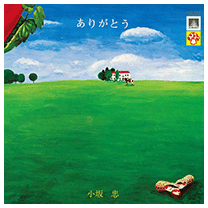 Chu Kosaka "Arigato" (Mushroom Records, 1971) (LP)
Chu Kosaka "Arigato" (Mushroom Records, 1971) (LP)
(Produced by Miki Curtis)
A lovely soft-rock album with strong country-rock leanings; apparently this was the first solo album from Chu Kosaka, aka Kosaka Masayuki (1948-2022) who had formerly been in the psychedelic rock band Apryl Fool with Haruomi Harono, who also (briefly) went in a pastoral, country-ish direction after that band broke up. Kosake plays several instruments on this album, including bass, guitar, and mandolin -- he's joined on the country side by banjo player Takashi Matsumoto, steel player Katsuo Ohno and fiddler Toshio Tanioka, as well as pianist Yumi Arai, who had kind of a Carole King/Carly Simon vibe.
Chu Kosaka "Hazukashi-So Ni" (Mushroom Records, 1973) (LP)
(Produced by Chu Kosaka)
Chu Kosaka "Horo" (Mushroom Records, 1975) (LP)
(Produced by Chu Kosaka & Haruomi Hosono)
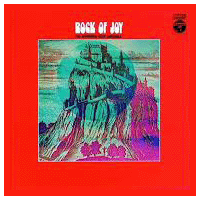 The Mannheim Rock Ensemble "Rock Of Joy" (Columbia Records, 1971) (LP)
The Mannheim Rock Ensemble "Rock Of Joy" (Columbia Records, 1971) (LP)
The only album, thankfully, of this gimmicky band who ground their way through a whole album of instantly recognizable classical and baroque tunes, in early 'Seventies hard-rock mode, replete with lots of snare drums, organ and electric guitar. It's reasonably vigorous, but corny, and pointless. The musicians enlisted for this major label novelty project -- Shinki Chen, Masayoshi Kabe, Hiro Tsunoda, Hiro Yanagida and others -- were also in a bunch of other, more meaningful Japanese rock bands, and thus the Mannheim Rock Ensemble name also pops up all over the place, but really... who cares? I mean, like, dude, do you really want to hear a totally gnarly, hardcore version of "Ode To Joy," conga drums and all? Really?
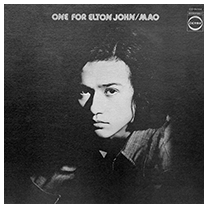 Mao "One For Elton John" (Denon Records, 1971) (LP)
Mao "One For Elton John" (Denon Records, 1971) (LP)
(Produced by Jiro Inagaki)
An odd one from something of a mystery artist... Mao was previously heard on an album by a one-off Japanese pop band called Sons Of Sun, then recorded these two albums and then -- poof! -- disappeared from the scene (or perhaps kept working under a different name...) Dunno what to tell you. This album seems to have disappeared as well, perhaps because of copyright issues(?) The songs are drawn from Elton John's earliest albums, as well as what appear to be a couple of B-sides and songs that were perhaps recorded first by other artists. I'm not bigtime, ultimate expert Elton-ologist, so I can't speak authoritatively, although it's possible the 1971 release date given on Discogs isn't completely accurate. The album jacket doesn't list all the musicians, just arranger/keyboard player Yasuhiro Koyama, who went on to record a couple of solo albums of his own. Anyway, this one's a mystery disc.
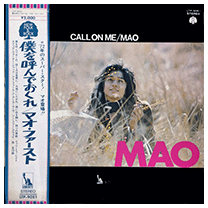 Mao "Call On Me" (Liberty Records, 1972) (LP)
Mao "Call On Me" (Liberty Records, 1972) (LP)
(Produced by Jiro Inagaki)
Side One of this album is all Japanese originals, while Side Two is a set of Carole King covers... and she sounds quite a bit like her! And we're talking big hits from King's Tapestry days -- "I Feel The Earth Move," "It's Too Late," "So Far Away" and "You've Got A Friend," and "Smack Water Jack," which also recorded by Danny Kortchmar's band, Jo Mama.
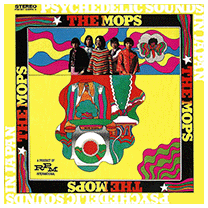 The Mops "Psychedelic Sounds In Japan" (Victor Records-Japan, 1968) (LP)
The Mops "Psychedelic Sounds In Japan" (Victor Records-Japan, 1968) (LP)
Japanese acid rock with a fairly hard edge, at least for the times, and certainly in comparison with many other "group sounds" bands. Originally formed in 1966 as a high school band playing guitar instrumentals ala The Shadows and The Ventures, The Mops soon fell under the sway of the psychedelic scene in San Francisco and London, emulating pop groups such a Eric Burdon & The Animals (including a cover of "San Francisco Nights") as well as any number of canonical bands heard on the Nuggets and Pebbles compilations. They were pretty successful, recording a string of eight albums between 1968-74, starting with this set which has a very heavy, Seeds-like, Leaves-y feel, with occasional hints of a dark, Iron Butterfly-ish inner filling. They were pretty good at matching the tone and intensity of these various far-flung American garage rockers, which sounds groovy on paper, though I'm afraid it may also mean they were as dreary and limited as much of that other greasy-kids/compilation album stuff; it probably depends on your individual temperament and whether you're at a point in your life where you need to hear more and more and more 'Sixties punk music, or whether you've kind of gotten it out of your system already. For me, this album is particularly disappointing because most of the tracks are sung in English, which showcases some truly impressive American accents, but is kind of a drag because, well, we already have a bazillion songs that sound like that already. Also, they're mostly covers of well-known hits by bands like The Animals, The Box Tops (cool), Jefferson Airplane and (ugh!) The Doors. The Japanese-language songs are more interesting, although they also sound a lot like the American songs that inspired them: propulsive and manic, but fairly one-dimensional. This was a band that was very up-to-date and with-it for the times, it's just that with that particular amphetamine-rock vibe, a little bit goes a long way. This debut disc has been reissued countless times; the version I picked up was the 2010 remaster on Cherry Red's RPM imprint... The sound quality is pretty good, but the real selling point is a the inclusion of two bonus tracks, "Atsuku Narenal" and "Omae No Subete O," which came out as a single in '68 and which have a more chaotic, more challenging, Zappa-esque feel. I haven't heard their other albums yet, but maybe they kept getting weirder(?) Any recommendations out there for a really well-curated, multi-disc best-of collection that weeds out the boring soundalike stuff and hones in on their more unique, more out-there original material?
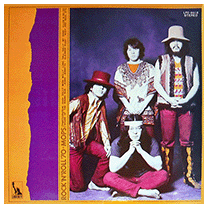 The Mops "Rock'N'Roll '70" (Liberty Records, 1970) (LP)
The Mops "Rock'N'Roll '70" (Liberty Records, 1970) (LP)
This album shows a tougher, more contemporary sound than their earlier garage-psych recordings, with the Mops pursuing a more crushing, power-chord oriented blues-rock sound, in line with the myriad boogie-rock bands that proliferated in the United States and UK in the early 'Seventies. Musically, they're pretty convincing, though again, the choice to sing in English rather than Japanese makes this less appealing, to me, at least. The choice of cover song material -- drawing on the Animals, The Beatles, Little Richard, Spencer Davis Group, etc., makes this seem a bit dreary, though it's mildly interesting that they were also delving a little bit into American blues tunes by the likes of Buddy Guy and Willie Dixon, although I'm sure they learned the material via some posturing whiteboy rock band or another. There are also a few tracks credited as originals composed by Hiromitsu Suzuki, Katz Hoshi and Roberto Wado, but even these are sung in English and mimic the faux "toughness" and mannered blues/soul swagger of the hard rock acts they were emulating. There's a very aggressive, amphetamine-laced manic feel to this album -- cool at the time, but kind of tedious now. Not my bag.
The Mops/The Flowers "Rock Live!" (Liberty Records, 1971) (LP)
Another live album... Side One is all Mops, Side Two is all by The Flowers.
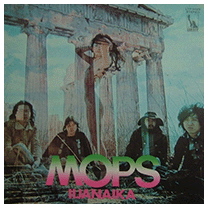 The Mops "Iijanaika" (Liberty Records, 1971) (LP)
The Mops "Iijanaika" (Liberty Records, 1971) (LP)
This includes their surprise pop hit, "Gekko-Kamen," which was a musical spoof of the popular 1950's Gekko-Kamen sci-fi TV show.
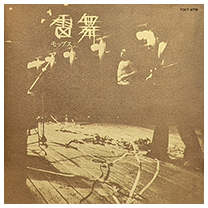 The Mops "Kaminari Mai" (Liberty Records, 1971) (LP)
The Mops "Kaminari Mai" (Liberty Records, 1971) (LP)
A potent live album with several longer jams, including pounding, crushing, aggressive covers of well-known songs such as "Gimme Some Lovin'," "To Love Somebody," and a particularly wild version of The Beatles "I Want To Hold Your Hand." It also includes a scream-y, discursive version of "Gekko-Kamen," with the band basically stopping in their tracks to joke around with the audience, before they get back into thrashing throught the rest of their set. The blaring electric guitar riffs are a sound that grew old and annoying during the course of the 'Seventies, but I have to admit this is a pretty powerful album -- at first I bristled, then I embraced it. Sounding a lot like the MC5, The Mops completely set aside the flower-power vibe of the '60s and fully embraced a subversive, confrontational hard-rock ethos, pushing as hard as they could against the stylistic boundaries of the times. This album stands on equal footing with anything made by better-known American or British bands with similar aims, and is a prime example of the hippie-era attempts at genre-crushing aggro rock, the closest to punk rock that they could get at the time. Worth checking out.
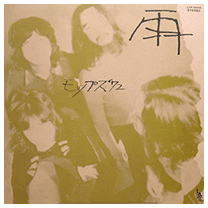 The Mops "Ame/Rain" (Liberty Records, 1972) (LP)
The Mops "Ame/Rain" (Liberty Records, 1972) (LP)
The Mops "Moppusu To 16 Ri No Nakama" (Liberty Records, 1972) (LP)
(Produced by Hideo Takahashi)
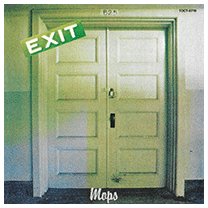 The Mops "Exit" (Liberty Records, 1974) (LP)
The Mops "Exit" (Liberty Records, 1974) (LP)
A slightly weird farewell album, considering this is the same band that produced such electrifying, confrontational hard-rock albums as Satori and Kaminari Mai. There are some shambolic, perfunctory rock-oldies medleys, which show remnants of their thudding, punky-metallic tendencies, but this album is also forward-facing and largely devoted to slicker, glossier material that hints at the mellower, arguably blander sounds that were about to dominate Japanese pop and rock in the late 'Seventies. Notably, the gooey title track, "Exit," is an extended guitar solo set to a soft, synthy backdrop, a track that may qualify as prog rock for some, but may sound more like smooth jazz to others. On the other hand, one of the final songs, "Nobody Cares," is a genuinely cacophonous prog-rock song with a unique tonality and a lot of interesting textures layered on top of each other. An eclectic record, which may satisfy different audiences in different ways... but for fans of the Mops's earlier, more anarchic albums, this was probably the right time for them to call it quits.
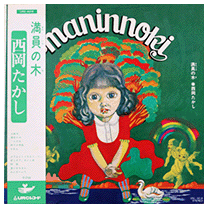 Takashi Nishioka "Maninnoki" (URC Records, 1973) (LP)
Takashi Nishioka "Maninnoki" (URC Records, 1973) (LP)
(Produced by Takashi Nishioka, Makoto Furukawa & Akira Kurokawa)
The first solo album from folk-rock auteur Takashi Nishioka, previously known for his work with the group Itsutsu No Akai Fusen, which he co-founded in 1967, as well as his experimental album with the group collective, Tokedashita Garasubako. Nishioka plays all the instruments on here, including eclectic choices such as the marimba and vibraphone, in addition to bass, drums, guitar, and piano. The quirky, mildly vexing opening track has a toylike, musicbox quality that may make you flinch and think, uh-oh, what have I gotten into here? The rest of the record, however, is intensely cool, populated with slinky arrangements and unusual tonalities, easing into more standard acoustic folk music in line with other URC albums, a sound best showcased on the Even A Tree compilation, which also features some of Nishioka's work. (See below.) If you're looking for material on the more magical end of the Japanese folk--rock spectrum, this disc's a doozy -- very listenable and very compelling. Note: a 2015 collector's edition reissue includes an equally alluring second disc with Nishioka live in concert, with about half the songs coming from this album. An extraordinary album.
 Takashi Nishioka & Shigueru Izumiya "Tomodachi Hajime" (Elec Records, 1973) (LP)
Takashi Nishioka & Shigueru Izumiya "Tomodachi Hajime" (Elec Records, 1973) (LP)
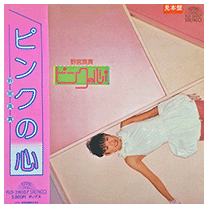 Maki Nomiya "Pinku No Kokoro/Pink Heart" (Flying Dog Records, 1981) (LP)
Maki Nomiya "Pinku No Kokoro/Pink Heart" (Flying Dog Records, 1981) (LP)
Goofy early '80's novelty/new wave/power pop material from singer Maki Nomiya, who became known as a leading figure in the pastiche-driven "Shibuya-kei" kitsch-pop style. Ms. Nomiya was also the lead singer of a New Wave band called Portable Rock, which released at least three full albums between 1985-1990, then in 1991 she became lead singer for the group Pizzicato Five. You can certainly hear a stylistic through-line from these bright, manic, nuttily un-serious tracks to Pizzicato's bright, manic, nutty stuff, including their later albums which broke through as international alternative/college-rock hits. No reason not to give this album a whirl... It's got kind of a coy, clever, B-52's-ish vibe, fun though maybe not for everyday listening. Ms. Nomiya has released a bunch of other solo albums, though I haven't checked them all out... I believe this was her first album, with most of her other work
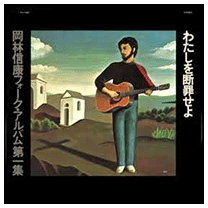 Nobuyasu Okabayashi "Tomoyo/ My Friend" (URC Records, 1969) (LP)
Nobuyasu Okabayashi "Tomoyo/ My Friend" (URC Records, 1969) (LP)
(Produced by Masaaki Hata & Takashi Nishioka)
I'm not sure how closely Bob Dylan's lyrical style correlates with the acoustic-based "protest folk" of Nobuyasu Okabayashi, but this is a pretty groovy album. The Dylan influence is clear, particularly with some of the subtle guitar riffs lifted from albums like Blonde On Blonde, et.al. Plenty of originals on here, though Okabayashi apparently also covers some Dylan stuff, as well as songs my American folk icons such as Eric Andersen and Tom Paxton (I say "apparently" because my sensitive little ears couldn't recognize the original melodies in the translated renditions, not even chestnuts like "Masters Of War") Okabayashi's recording career began in 1968, and the time this came out, his brand of stripped-down, impassioned acoustic folk had been kind of "over" for several years in the States -- other than Dylan and Baez, most of the East Coast folk pioneers were struggling to maintain relevance in the acid-soaked late-'Sixties end times. But for Japanese audiences, it was pretty new, and Okabayashi was a major figure in their early 'Seventies folk boom. Definitely worth a spin! The backing band included fellow folkie Takashi Nishioka on harmonica, as well as
Takasuke Kida (organ and piano), Takashi Nagano (bass), Hitoshi Tanino (bass), and Hiro Tsunoda on drums.
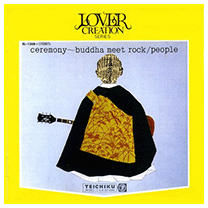 People "Ceremony: Buddha Meet Rock" (Teichiku Records, 1971) (LP)
People "Ceremony: Buddha Meet Rock" (Teichiku Records, 1971) (LP)
(Produced by Tatuo Kawabe & Naoki Tachikawa)
An interesting twist on the whole Eastern mysticism-meets-Western pop culture thing, notably coming at it from a different direction than what western rock fans are used to... Four rock musicians play off of a modest Buddhist chorus, with some additional percussion, including an occasional gong note or two. The rockers -- psychedelic guitarist Kimio Mizutani, keyboardist Yusuke Hoguchi, drummer/bandleader Kiyoshi Tanaka, and bassist Hideaki Takebe -- included some former "group sounds" garage rockers, but were largely known for major label session work in prefab pop-covers bands such as Old Grand Dad. All of the tracks were composed by producer Naoki Tachikawa, with grounding in Buddhist musical and lyric traditions such as the Shomyo chant and gatha text. The album opens disastrously, with guitarist Mizutani chaotically wanking off on the thirteen-minute long "Shoymo, Part One," his shrill, disorganized rock riffs providing a counterpoint, I suppose, to the otherwise compelling chanting, which is embedded in a dreamily-textured ambient backdrop. The torturous guitar showboating goes on and on and on, and is not very rewarding. But after suffering through that particular bout of raw self-indulgence, the rest of the record settles into a much mellower mode, with evocative, velvet-textured, proto-ambient arrangements. The experimental rock vibe reasserts itself on the penultimate track, "Prayer, Part Two," with Mizutani's crunchy power chords grinding along as a Yoko Ono-esque female vocalist simulates orgasm amid a modestly avant arrangement: it's not nearly as annoying or pointless as the longer "Shoymo" track, and holds up as difficult-listening kitsch. Overall, this is a pretty groovy record... I imagine that Japanese listeners, used to the many contemporary albums of straight, traditional Buddhist music, would have found this album a richly-crafted, convention-breaking innovation; as an uninformed outsider, I would agree, setting that one track aside.
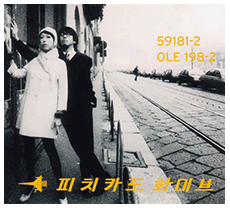 Pizzicato Five "Happy End Of The World" (Matador Records, 1997)
Pizzicato Five "Happy End Of The World" (Matador Records, 1997)
Gimmicky but great, Japan's Pizzicato Five are the template that many mix-and-match retro-pop-collage bands (Stereo Total, Die Moulinettes, etc.) are stamped from, a pop-pastiche style that in Japan was known as "Shibuya-kei," named after Tokyo's trendy Shibuya district, where all the cool stuff happens. Originally formed a regular-old rock band back in the New Wave era, Pizzicato Five gradually whittled down to a duo-plus centering around Yasuharu Konishi and Maki Nomiya, who joined the group in 1991 and had her own background in giddy, quirky power-poppish New Wave music. This seamless, skillful sample-y blend of hip-hop, electronica, spy jazz, house music, sunshine pop and Muzak ably is a real hoot: fun music! What a concept! Some Pizzicato Five albums have weak spots; this one really doesn't. Pop culture camp taken to previously unimaginable heights. Recommended!
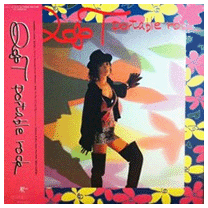 Portable Rock "Q. T." (Japan Records, 1985)
Portable Rock "Q. T." (Japan Records, 1985)
A synthy new wave/electro-pop group perhaps best known as Maki Nomiya's band prior to joining Pizzicato Five in 1991. You can see why there was an affinity between them -- the same bright, perky, odd-duck vocals are present here, along with a slightly hallucinatory cheerfulness, and plenty of synths and drum machines for those so inclined. This feels a bit two-dimensional and constrained, but it's not at all unpleasant. The full band consisted of Nobuo Nakahara (bass and synthesizer), Maki Nomiya (vocals) and Saeko Suzuki (drums), Tomofumi Suzuki on synthesizer and guitar, with Shigeo Miyata joining later on... They all seem to have moved between various other bands -- Pizzicato Five, Original Love, etc. -- though to be honest it might be a little too much for me to track down. There's some fun stuff, but maybe diminishing returns after a while.
Portable Rock "Dance Volunteer" (Japan Records, 1987)
Portable Rock "Beginnings" (Solid Records, 1990)
(Produced by Portable Rock, Hiroshi Haraguchi & Hirobumi Suzuki)
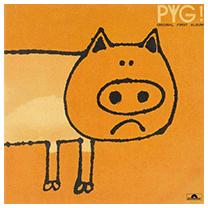 Pyg "Pyg! Original First Album" (Polydor Records, 1971) (LP)
Pyg "Pyg! Original First Album" (Polydor Records, 1971) (LP)
An eclectic though meandering set of (I guess) post-psychedelic folk-rock which veers a bit dubiously into languid, proggish territory. They're trying out all kind of approaches on this album, but it all feels muddled and inconclusive. My ears perked up on the album's opening notes, a tinny, Buzzcocks-like guitar riff, though sadly this was immediately overshadowed by an annoying, showboating, Keith Emerson-esque rock organ, which is dominant on several other tracks. The organ playing came courtesy of ex-Spiders keyboardist Katsuo Ohno, who is joined by another fellow arachnid, guitarist Takayuki Inoue... The rest of the band was similarly recycled from other GS bands: lead singer Kenichi Hagiwara and Hiroshi Oguchi were from The Tempters, while singer Kenji Sawada (aka Julie) and bassist Osami Kishibe were from the Tigers. While billed as a supergroup, I'm not sure they really coalesced together as a band, at least not on this album. The songs mostly sound like exercises -- fine on the surface, but without the internal momentum that make them exciting or fun. I could be wrong. I often am. But I just didn't "feel it" on this one.
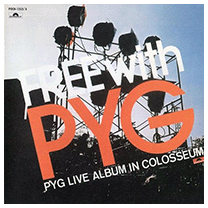 Pyg "Free With Pyg: Pyg Live In Colosseum" (Polydor Records, 1971) (LP)
Pyg "Free With Pyg: Pyg Live In Colosseum" (Polydor Records, 1971) (LP)
Oh dear. A live double LP, eh? Well, actually the sound quality is pretty good, although the tilt towards generic, early 'Seventies jam-band arena rock is a little less than compelling. But if the phrase "Japanese version of Small Faces" excites you, by all means, check this one out. Plenty of shrill, overly long guitar guitar solos, a little bit of annoying organ playing, and more cowbell. Way more. Zero subtlety, though. I guess they also released a couple of singles the following year, then broke up. Not sure what all the various bandmembers did after that, although drummer Hiroshi Oguchi joined the glam band Vodka Collins, which had a very David Bowie-like vibe.
 Ryukyu Underground "Ryukyu Underground" (Riverboat/Respect Records, 2002)
Ryukyu Underground "Ryukyu Underground" (Riverboat/Respect Records, 2002)
Beautiful ambient-dance electronica from the island of Okinawa, south of Japan... Well, kind of from Okinawa. Ryukyu Underground is a cross-cultural project led by two electro-oriented white guys, Jon Taylor (from the American Midwest) and Keith Gordon, who hails from the UK. They met in Okinawa in 1998, where they discovered a mutual interest in the local traditional music, as well as their shared backgrounds in electronic music. This was the first of a half-dozen albums and innumerable singles and remix tracks, and it's pretty alluring. The interweaving of styles is skillfully done and respectful of the Okinawan roots: the specifically Asian elements are both intact and integral to the music. The opening tracks feature Japanese vocals and koto strings mixed in with standard-issue beats; later the album shifts into mellower material, with spacey songs such as "Shinkaichi" and the alluring "Tinsagu Na Hana Dub." I personally don't fret about "cultural appropriation" in cases like this... With music in particular, "culture" is meant to be experienced, appreciated, built on, and expanded. These guys do a pretty good job of it. Nice stuff... definitely worth tracking down.
 Salon Music "My Girl Friday" (Canyon Records, 1983)
Salon Music "My Girl Friday" (Canyon Records, 1983)
(Produced by Salon Music, Masayuki Hayashi, Yasuhiko Terada & Taeko Suzuki)
Goofy, eclectic, English-language keyboards-and-guitars cabaret pop from this pioneering new wave band, which sure sounds on this debut album an awful lot like Sparks. The group eventually narrowed down to the core duo of Hitomi Takenaka and Zin Yoshida. Yoshida was contemporaneously also in the more commercial sounding electro-pop/new wave band Quadraphonics, and he became known as a producer/mentor for later groups such as Flipper's Guitar, which took the Japanese new wave sound into even more adventurous territory. The Beach Boys-ish song "Muscle Daughter" is the track I'd pick from this album; wish they'd sung the rest of it in Japanese, though.
 Salon Music "La Paloma Show" (Canyon Records, 1984)
Salon Music "La Paloma Show" (Canyon Records, 1984)
(Produced by Salon Music, Masayuki Hayashi, Taeko Suzuki Yukihiro Takahashi & Yutaka Uriu)
They really do sound a lot like Sparks, with the same brand of kooky eclecticism that edges near the borders of contemporary pop but lingers, perversely, in the flickering shadows just beyond the campfire lights of commercial viability. There's the new wave-ish instrumentation, as well as the puckish duet vocals between Hitomi Takenaka and Zin Yoshida, two people delighting in an endless series of inside jokes. Sure, it can wear thin pretty quickly, but it's still a hoot. Their sprightly new wave/indiepop cover of Syd Barrett's "See Emily Play" is surprising as well. Very chirpy!
Salon Music "Topless" (Canyon Records, 1985)
Basically more of the same, though this album is a little calmer and less manic than their first two...
Salon Music "This Is Salon Music" (Moon Records, 1987)
(Produced by Hitomi Takenaka and Zin Yoshida)
Salon Music "O Boy" (Canyon Records, 1988)
Salon Music "Psychic Ball" (Alfa Records, 1990)
The Savage "Album Number One: In The Palm Of My Hand" (Philips Records, 1966) (LP)
A short-lived "group sounds" 'Sixties garage/pop band. The Savage also shared a split LP with the better-known, longer-lived Spiders (below). The group was formed in 1965, with members Renkichi Hayashi, Yoshio Okushima, Akira Terao, and Junichi Watanabe, and apparently split up around 1968.
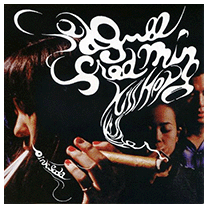 Seagull Screaming Kiss Her, Kiss Her "Pink Soda" (EP) (Polystar-Japan, 1996)
Seagull Screaming Kiss Her, Kiss Her "Pink Soda" (EP) (Polystar-Japan, 1996)
Seagull Screaming Kiss Her, Kiss Her "Fly" (EP) (Polystar-Japan, 1996)
Seagull Screaming Kiss Her, Kiss Her "Sweet Home" (EP) (Polystar-Japan, 1997)
Vocalist Aiha Higurashi certainly removes herself pretty far from the confines of the traditional role of woman in Japanese society... Equal parts punky Sleater-Kinney rriot ggggeisha, latter-day Nina Hagen/Iggy Pop hard rocker, and Bongwater artsy-fartster, Higurashi runs a wide gamut of purposefully irritating material. Japanoise fans who aren't too hung up on the whole rejection-of-melody thing may find these CD-EPs fun; like many artsy musical outings, this is perhaps easier to appreciate for its intellectual audacity, rather than its listenability or long-term durability. Challenging, though compelling.
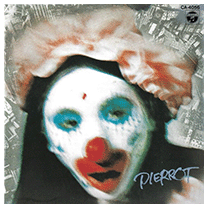 Hiroshi Segawa "Pierrot" (Propeller Records, 1972) (LP)
Hiroshi Segawa "Pierrot" (Propeller Records, 1972) (LP)
The lone solo album from singer/guitarist Hiroshi Segawa, previously of the group sounds band The Dynamites... This opens on a questionable note, with a goofy, prefab-sounding soft-pop song that may set off a few warning bells, despite a subtle country-rock undertone. But things pick up quickly, as Segawa dips into some more legit-sounding country vibes, as well as some Stones-y hard rock, semi-glam, and a lot of bubblegummy material vaguely in line with The Bay City Rollers and their ilk. It's a fun record. Interesting backing band, including two members of the Flower Travelling Band, guitarist Hideki Ishima and drummer Jun Koziki, as well as Katsuo Ohno (keyboards), Tetsu Yamauchi (bass) and some satisfying Beggars Banquet-ish slide guitar work by an unidentified picker, probably Segawa himself. Definitely worth a spin!
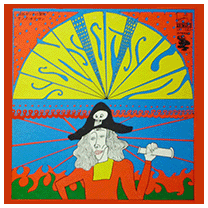 Sons Of Sun "Kaizoku Kiddo No Boken" (Victor Records, 1972) (LP)
Sons Of Sun "Kaizoku Kiddo No Boken" (Victor Records, 1972) (LP)
An easy listening/bubblegum pop album, which may have been a children's music album, but will probably appeal to many kitsch-friendly grown-ups as well. This one-off group included several well-known rock-pop session players -- Kazuyuki Nagaoka (electric guitar), Hideaki Takebe (bass), Kiyoshi Tanaka (drums) Hiro Yanagida (keyboards) -- as well as mystery singer "Mao," who also recorded a couple of curious soundalike albums around this same time, the first being an Elton John cover album, while the second featured an album side's worth of Carole King songs. The best-known song off this album is "Suburban Railway," a twee, slightly cloying confection which is built around a surprising durable central melody. Alas, this was the only album by this particular combo.
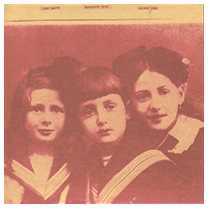 Speed, Glue & Shinki "Eve" (Atlantic Records, 1971) (LP)
Speed, Glue & Shinki "Eve" (Atlantic Records, 1971) (LP)
(Produced by Izuko Orita)
Headbanger alert! Here's a super-hip, very- early-'Seventies-sounding hard rock band fronted by psych-rock guitarist Shinki Chen, who was apparently often compared to Jimi Hendrix, although this Led Zep-styled set might have you thinking more of Jimmy Page. Musically cool (if you go for this stuff) though it's a shame the vocals were in English. This lineup included bassist Masayoshi Kabe, who generates some really fat, fuzzed-out tones, and drummer-singer-guitarist Joey Smith, a Filipino expat who was previously in a Beatles-inspired group called D'Downbeats. (More about them in my outside-of-Japan Asian Pop section...)
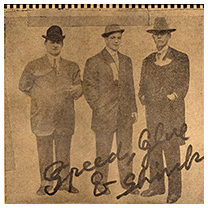 Speed, Glue & Shinki "Eve" (Atlantic Records, 1972) (LP)
Speed, Glue & Shinki "Eve" (Atlantic Records, 1972) (LP)
Another superior hard rock/power chord album masterminded by Shinki Chen, this time backed (still) by Masayoshi Kabe and Joey Smith, although at some point Smith's longtime hometown musical collaborator Mike Hanopol was brought in as a replacement for Kabe, and a couple of other Japanese rockers were involved as well. This is great record if you like the style: potent, sleazy, greasy drugged-up blues-based acid rock which refreshingly veers away from the Led Zep sound of their first album into a wider array of styles, edging towards glam and mid-'Seventies cock rock... Fans of, oh say, Johnny Thunder, Thin Lizzy, Foghat and the Stones might want to check this out. Indeed, it's so good I don't even mind they were singing in English. A few odd, abrupt digressions -- such as the slick, fusion-adjacent "Red Doll," the delicate, musicbox irony of "Chuppy," of the pointless proggy noodling of the album closer, "Song For An Angel" -- but mostly this is a hard rockers delight. Shinki Chen redeems himself!
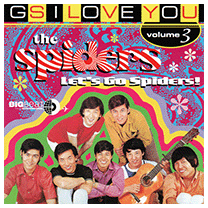 The Spiders "GS I Love You, Volume Three: Let's Go Spiders!" (Ace/Big Beat Records, 2000)
The Spiders "GS I Love You, Volume Three: Let's Go Spiders!" (Ace/Big Beat Records, 2000)
A cute Japanese garage-pop "group sounds" band which was going strong right at the height of Beatlemania. Formed in 1961, and together for the rest of the 'Sixties, The Spiders had a tougher edge than a lot of their contemporaries, but also a strong melodic sense. The band seems to have had a pretty stable lineup, including Jun Inoue, Takayuki Inoue, Hiroshi Kamayatsu, Mitsuru Kato, Tomio Maeda, Katsuo Ohno, Masaaki Sakai, and Shouchi Tanabe, As well as this fab best-of, there are numerous other compilations reissues out there. along with reissues of their many individual albums... One may be enough. You can also get your feet wet slowly and check out Spiders tracks on the GS I LOVE YOU Japanese garage rock collections first, which were compiled by the same fellow who put this collection together...
The Spiders "Album Number One" (Philips Records, 1966) (LP)
The Spiders "Album Number Two" (Philips Records, 1966) (LP)
The Spiders "Album Number Three" (Philips Records, 1967) (LP)
The Spiders/The Savage "The Spiders Meet The Savage" (Philips Records, 1967) (LP)
The Spiders "Album Number Four" (Philips Records, 1967) (LP)
The Spiders "Album Number Five" (Philips Records, 1968) (LP)
The Spiders "Spider's Seventh Year" (Philips Records, 1968) (LP)
The Spiders "Spiders '69" (Philips Records, 1969) (LP)
The Spiders "Rock'n Roll Renaissance" (Philips Records, 1970) (LP)
 Strawberry Path "When The Raven Has Come To The Earth" (Philips Records, 1971) (LP)
Strawberry Path "When The Raven Has Come To The Earth" (Philips Records, 1971) (LP)
(Produced by Masaharu Honjo & Tadataka Watanabe)
The lone album by this super-Hendrixian hard rock band, with a deep, bluesy base. Also, sadly, more lyrics in English. They sound convincing, but it would have been so much more interesting in Japanese. The first side of this album is pure Jimi Hendix fan-club stuff, while the second side loosens up and enters more diverse, more experimental territory. Not totally my cup of tea, but a solid set of cutting-edge, hippie-era Japanese psych-rock. The musicians included Isao Eto (bass), Shigeru Narumo (piano, bass and guitar) Hiro Tsunoda (drums and vocals) and George Yanagi (vocals). Like many of the rock bands of this era, this was but one of many projects for the various musicians; Narumo, Tsunoda and Yanagi quickly went on to form the band Flied Egg (hah, hah) which recorded a couple of albums the following year.
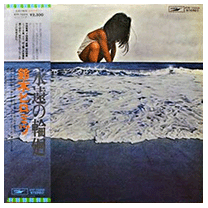 Hiruomitsu Suzuki "Eternal Reincarnation" (Express Records, 1976) (LP)
Hiruomitsu Suzuki "Eternal Reincarnation" (Express Records, 1976) (LP)
(Produced by Masaharu Honjo & Tadataka Watanabe)
A solo album from the lead singer of the 'Sixties "group sounds" band, The Mops... This comes after the band had evolved from a brash garage-rock act into a more expansive, multi-textured psychedelic sound, though Suzuki seems to have taken it a step further by embracing the softer, post-power-chord ethos of the late-'Seventies Japanese scene, and produced more of a gooey orchestral pop album, laced with a few odd, wailing electric guitar riffs, all framing Suzuki's strained, emotive vocals. Honestly, it seems a bit torturous, and far removed from the Mops' signature trippy rock sounds. Apparently Suzuki died fairly young, in 2007, as a result of liver cancer. This was apparently his only solo album.
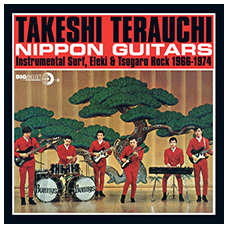 Takeshi Terauchi "Nippon Guitars: Instrumental Surf, Eleki & Tsugaru Rock, 1966-1974" (Ace/Big Beat Records, 2011)
Takeshi Terauchi "Nippon Guitars: Instrumental Surf, Eleki & Tsugaru Rock, 1966-1974" (Ace/Big Beat Records, 2011)
I suppose eventually I'll get around to creating a separate artist page for bandleader Takeshi Terauchi (1939-2021) but that will prove to be a daunting task. Born in 1939, Terauchi was a pioneering figure in Japanese pop, an early adopter of the electric guitar who after working in a variety of bands, launched his own solo career as a rock (or rock-adjacent) bandleader and the primary creator of the pop style known as "eleki," which centered around... electric guitars! Terauchi was more or less Japan's answer to Link Wray and Dick Dale, or perhaps more accurately, the UK's Cliff Richards and his band The Shadows. Terauchi's early albums showcased rock and rock-flavored guitar instrumentals, some of it closely aligned with American surf music, but much of it more pop-oriented, although many tracks had a distinctly Japanese character, including a long string of amped-up adaptations of traditional folk tunes. There is literally no limit to the number of Terauchi-related records available today, but this is an excellent introduction to his work, zeroing in on two of his bands, The Bunnys and the amazingly prolific Terry & The Blue Jeans. (The Blue Jeans discography starts in 1962, and continued unabated well into the 2010s...) This is a very strong collection: some of the tracks are sizzling and revelatory, though admittedly if you listen to the entire album from end to end, you may find it a little repetitive... Overall, though, wow. Fans of Dick Dale, et.al., will definitely want to check this out.
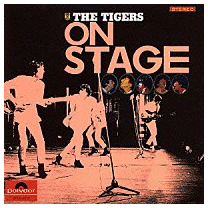 The Tigers "On Stage" (Polydor Records, 1967) (LP)
The Tigers "On Stage" (Polydor Records, 1967) (LP)
The first album from The Tigers, a fairly prefab Japanese "group sounds" pop-rock ensemble, a group that also had a movie deal with Toho Pictures and were featured in several late 'Sixties teenybopper rock films, including at least three that were built specifically around the band. They were very much trying to cash in on the British Invasion/Beatlemania vibe, and kicked off their career with this shrill, tinny concert recording, covering a ton of contemporary pop-rock and soul hits, including "Land Of 1,000 Dances," "Pain In My Heart," "As Tears Go By," and a bunch of Rolling Stones tunes strung together in a medley. The band included lead singer Kenji Sawada, drummer Minoru Hitomi, Katsumi Kahashi (lead guitar), Osami Kishibe (bass), and Taro Morimoto on rhythm guitar -- in full boy-band mode, they were assigned cute nicknames, like Julle, Sally, Toppo and, oddly, Pee. They appear to have been entirely a major-label construct, and it's not a stretch to call them the Japanese version of the Monkees -- indeed, they covered the Monkees' theme song on this album, simply switching out their out band name, in a hey, hey were The Tigers kinda way. I regret not picking up an original copy of this first album when I saw in at my local Record Hut -- I noticed all the US and UK rock covers and assumed it would be a trite, trivial album... Which it is, except that when I finally heard it, the amped-up, fainting-teenagers, constantly screeching audience participation aspect sounded totally awesome... And my assumption that this was one of those GS bands that started out rigidly covering foreign rock hits then loosened up and started recorded cooler stuff later on turned out to be completely backwards. Instead, The Tigers took on a blander, softer persona, more in keeping with the bland pop-vocals ethos heard in mainstream Japanese pop at the time. Oh well. Live and learn.
The Tigers "The World Is Waiting For Us" (Polydor Records, 1968) (LP)
The Tigers "Human Renascence" (Polydor Records, 1968) (LP)
The Tigers "Freedom, Hope And Friendship" (Polydor Records, 1970) (LP)
The Tigers "The Tigers Sound In Colosseum" (Polydor Records, 1970) (LP)
(Produced by Kuni Nakai, Ikuzo Orita & Yukio Sasaki)
The Tigers "Finale" (Polydor Records, 1971) (LP)
Though billed as their swan-song, this wasn't the last Tigers album -- an early 'Eighties reunion yielded a couple more...
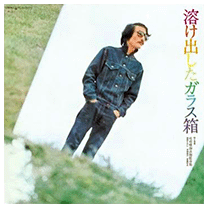 Tokedashita Garasubako "Tokedashita Garasubako/Melted Glass Box" (URC Records, 1970) (LP)
Tokedashita Garasubako "Tokedashita Garasubako/Melted Glass Box" (URC Records, 1970) (LP)
(Produced by Masaaki Hata & Sujiro Yotsuie)
A super-spacey, mega-cosmic collaboration between Takasuke Kida (drums and vocals), Takashi Nishioka (guitar and vocals), Mashashi Saeki (bass), Tesuo Saito (vocals) and Kazuo Takeda (lead guitar), including veterans of various late 'Sixties Japanese hard rock/psych bands. Music fans frequently toss the term "psychedelic" around in an overly-casual way, but this is a record that has a genuinely lysergic, dilated pupils feel to it -- these guys were definitely tripping balls when they made this album. This stuff is way, way out there, and while not unpleasant to listen to, it is pretty challenging and avant. Think, maybe, the earliest Pink Floyd records, or Syd Barrett's solo work, but filtered through an even more demanding modernist freeform art-music aesthetic. Amazing this even came out, but it's a good marker for just how "out there" the hippie-era Japanese psych-folk scene could be... It's also listed as the first album by "folk" artist Takashi Nishioka, who went on to record quite a few albums under his own name; it's also considered one of the early 'Seventies album by an amorphous group called The Sun Orchestra which adds a wider instrumental range beyond the core rock quintet.
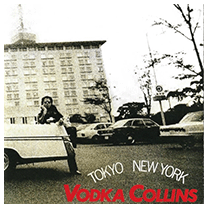 Vodka Collins "Tokyo New York" (Express Records, 1973) (LP)
Vodka Collins "Tokyo New York" (Express Records, 1973) (LP)
Cool, though highly derivative Japanese glam rock. Like many early 'Seventies rock bands, Vodka Collins had a complicated back story, with several musicians drawn from a string of extinct bands from the 'Sixties and early 'Seventies, but the end result is pretty cool, and surprisingly cohesive. There are obvious traces of T-Rex, Thin Lizzy, even the Bay City Rollers, but more than anything else, David Bowie. Even to the point of including songs with titles like "Diamond To Dungarees," "Terminal City" and "Billy Mars." It's not subtle, but it's kind of fun. Unfortunately they sing in English on most songs, but occasionally in Japanese, which is a lot more enjoyable. If you like the style, this is a pretty solid record, groovy both for the kitsch factor, and taken at face value as a record that was very much up with the times. I just wish they'd sung everything in Japanese. This was the group's only contemporary 'Seventies album, though they reunited twenty years later, and also recorded a bunch of stuff in the 1990s.
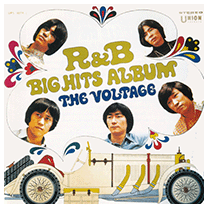 The Voltage "R&B Big Hits Album" (Union Records, 1968) (LP)
The Voltage "R&B Big Hits Album" (Union Records, 1968) (LP)
A generic, prefab pop-covers band specializing in American pop-soul songs... This is not "deep cut" material, but rather a bunch of well-known classics from Atlantic and Motown Records, et.al., tunes like "Mustang Sally," "Sittin' On The Dock Of The Bay," "Funky Broadway," "Soul Man" and "In The Midnight Hour" -- the kind of big radio hits that hip white kids were grooving out on at the time. Not sure of all the band members, but the Voltage included lead singer Yosuke Tachibana, who also released a few solo singles as well as a solo album in the early '80s. Their version of Sam & Dave's "Hold On I'm Comin' " can be heard on the first GS I Love You compilation. (See below.) They also put out some singles, possibly with material not included here.
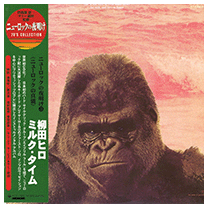 Hiro Yanagida "Milk Time" (Liberty Records, 1970) (LP)
Hiro Yanagida "Milk Time" (Liberty Records, 1970) (LP)
A jazz-fusion instrumentals set which is occasionally taxing, though generally not unbearable. It's the first solo record by keyboardist Hiro Yanagida, a prolific session player present on many of the iconic hard rock and psych-prop albums of the era, including more than a few projects that were, in retrospect, really kind of annoying. He ping-pongs around a little on this disc, opening on a soft, orchestral tone, then careens into a then-hip, fuzzed-out psychedelic hard-rock number showcasing rock guitarist Kimio Mizutani, who peppers in a few blaring solos elsewhere on the album. Mostly, though, Yanagida cedes the spotlight to far gentler soloists, notably flautist Nozomu Nakatani and violin player Hiroki Tamaki, who work in more a subtler baroque pop mode. As composer, arranger and musical host, Yanagida is surprisingly gracious and keeps his own performances on a more demure level -- no rock-fusion showboating on his part. This isn't entirely my cup of tea, but the more classically-oriented, melodic tunes wind up being fairly compelling, or at least pretty easy on the ears.
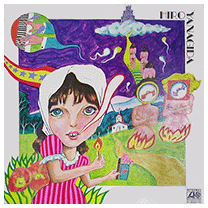 Hiro Yanagida "Hiro Yanagida" (Atlantic Records, 1971) (LP)
Hiro Yanagida "Hiro Yanagida" (Atlantic Records, 1971) (LP)
An intensely irritating and self-indulgent free-jazz rock album, aggressively repetitive and driving, with plenty of protracted guitar solos, annoying accompaniment and an absolute unwillingness to give listeners any relief... Except, that is, on a few tracks on Side Two, notably the Beach Boys-styled "Always," which provides an unexpected lull, a pleasant, wispy pop departure, ironically inserted between all the Zappaesque furor. Speaking of Zappa, the arch, English-language rock oldies parody, "My Dear Mary," would fit in nicely with any of the early Mothers Of Invention albums... or on a Dr. Demento show. It gives way to another Brian Wilson-esque tune, "Melancholy," which closes the album out. This record is 89% completely, totally not my cup of tea, though the three non-awful tunes are worth salvaging. This set is revealing, though, of where the real interests of many of Japan's veteran rock musicians lay at this juncture: pop music was passe, and experimentalism and prog/jazz stuff had allure. Difficult music fans might really dig this disc, but I did not.
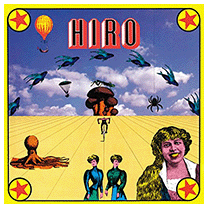 Hiro Yanagida "Hiro" (URC Records, 1972) (LP)
Hiro Yanagida "Hiro" (URC Records, 1972) (LP)
(Produced by Masaaki Hata & Akira Kurokawa)
The folks at the URC folk-rock powerhouse nudged Yanagida into a more palatable, mellow brand of jazz fusion, more in line with commercially successful artists such as Chick Corea or Tom Scott, replete with saxophones, brass, flute, more muted electric guitars and whatnot. There are also non-instrumental ballads and soft-pop musings, and even several radio-friendly, twee bubblegum pop tunes, and plenty of mellow smooth jazz. It's a bit gooey, and perhaps could be seen as a cynical sellout move, but it's a nice break from the unlistenable direction Yanagida had taken before. A relief, even.
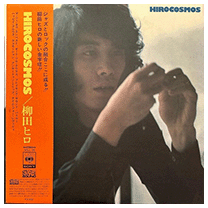 Hiro Yanagida "Hirocosmos" (CBS Records, 1973) (LP)
Hiro Yanagida "Hirocosmos" (CBS Records, 1973) (LP)
(Produced by Hiro Yanagida, Jynn Maeda & Yuichi Maejima)
A very early 'Seventies-ied out jazz fusion set. Pleasantly mellow in comparison to his more "challenging" material. Hiro Yanagida plays Hammond organ, Mellotron, piano and synthesizer -- some passages have a a very laid-back style, some are a bit more cluttered or frenetic. Not really mu cup of tea, but a mostly-classy set that fusion fans should enjoy. He's accompanied by Tsugutoshi Goto on bass, Masami Kawahara (percussion), Takeru Muraoka (saxophone), and guitarist Masayoshi Takanaka, also a few nature sounds, like breaking waves. Make of that what you will.
Hiro Yanagida "The UFO Encounter" (CBS Records, 1978) (LP)
Hiro Yanagida "Love Synchroid" (Starchild Records, 1986) (LP)
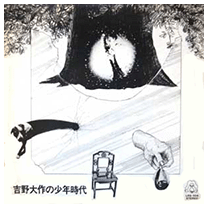 Daisaku Yoshino "Daisaku Yoshino's Childhood" (1973) (LP)
Daisaku Yoshino "Daisaku Yoshino's Childhood" (1973) (LP)
Real loner/outsider folk/rock material here. Playing mostly solo on either electric or acoustic guitar, Daisaku Yoshino inhabits the same naifish, punk-adjacent sphere as oddball artists such as Jandek or Jonathan Richman, with intense, unhurried, bare-bones rock incantations... This album builds in intensity and appeal: at first blush the initial tracks seem somewhat marginal, but with each passing minute he draws you in, initially seeming like an isolated, solitary figure, then briefly exploding into a grinding, compelling proto-punk number before veering back into a more introspective mode. I'm afraid I can't single out specific songs, since the album is broken up into about twenty shorter song fragments which don't line up with the "ten" tracks listed on the cover. But this is a fascinating album, matching up with the barrier-breaking experimentalism of other early 'Seventies rockers, while also powerfully anticipating the stripped-down "lo-fi" sound of various 1980s/'90s post-punk artists, dipping into power-pop, proto-punk and pleasantly mellow dilettante tang. It really doesn't sound much like something from '73, and was very ahead of its time. Definitely worth a spin. Very surprising.
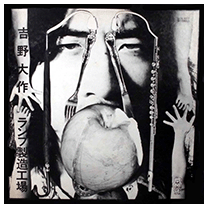 Daisaku Yoshino "Lamp Factory" (1974) (LP)
Daisaku Yoshino "Lamp Factory" (1974) (LP)
This is a much more unified, linear album, with fewer stylistic lurches, though also less surprising and less compelling. Generally speaking this is mid-tempo, low-key material, with a hefty dose of country twang, though also a slightly grating hard-rock edge that pops up here and there. You could credibly categorize this as a country-rock record, perhaps is the mode of 1990s bands such as Wilco, Old 97s, et. al... just fifteen, twenty years earlier. This didn't wow me as much as his first album, but there were several tracks that I liked, coming at it from a country angle.
Daisaku Yoshino "Operation Yoshino" (Cragale Records, 1986) (10")
(Produced by Daisaku Yoshino)
Daisaku Yoshino "1973-1980" (Nihonbare Records, 1996)
Yoshino's career was spread out over a few decades, with the two early 'Seventies albums above followed by stints with various bands -- Flying Rabbits, Kotai Seinen, Daisuck & Prostitute -- as well as a return to solo recordings much later on. This introductory best-of combines a half-dozen tracks from his 1973 debut along with some late 'Seventies demos and four songs from a couple of singles. You can also try tracking down his original albums (which have been frequently reissued) though this is a good entry point, including some nice rarities. Also, I'm leaving a lot of later stuff out, so give Discogs a whirl if you want to track down his other albums.
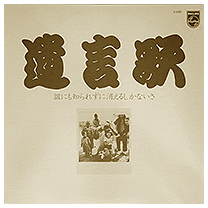 Yuigon Uta "Darenimo Shira Rezu Ni Kieru Shika Nai Sa" (Philips Records, 1971) (LP)
Yuigon Uta "Darenimo Shira Rezu Ni Kieru Shika Nai Sa" (Philips Records, 1971) (LP)
An insanely cool avant-psychedelic album which brutally merges traditional Japanese folk music, replete with traditional instruments such as the biwa (lute), flutes and taiko drums with piercing, aggressive rock guitars and goofy carnival-music hall-dixieland romps, sound collages and "western" instruments such as cellos and saxophones. It's a pretty wild scene, equal parts Arthur Brown/Frank Zappa/Bonzo Dog Doo Dah Band/GG Allin/and Jandek. Maybe not an album you'd put on to relax with at home, but certainly one you'll want to give a listen to at least once. Or twice. Among the rockers involved with this excursion are Itsuroh Shimoda, Hiro Yanagida, at the time the keyboardist for the psychedelic band Apryl Fool, guitarists Takahiko Ishikawa and Kimio Mizutani and others... Nutty, cool, and a wee bit difficult! [BTW, the album title translates roughly to "I Have No Choice But To Disappear Without A Trace." So zen!]
 Various Artists "THE CULT G. S. -- THE COMPLETE SINGLES" (Teichiku Entertainment, 2000)
Various Artists "THE CULT G. S. -- THE COMPLETE SINGLES" (Teichiku Entertainment, 2000)
"Group Sounds," or GS, was how Japan came to embrace Beatles-era rock. The Asian "rock" sound ranged from ultra-tepid pop vocals (think, The Association, only milder...) to all-out raging, crazy psychedelic garage rock. This disc -- a rather expensive import -- features bands such as The Toys, The Napoleon, D'Swooners, The Unicorns and The Eagles, who were all decidedly on the mellower side of the Asian pop spectrum. The liner notes are all in konji, so I could only make out recording dates -- all apparently in the 1966-68 range. Despite the fab Peter Max-ish album art, the music is pretty softcore. (For some wilder stuff, check out the GS I LOVE YOU collections below...)
 Various Artists "THE CULT G. S. -- MONSTERS, VICTOR EDITION" (Teichiku Entertainment, 2002)
Various Artists "THE CULT G. S. -- MONSTERS, VICTOR EDITION" (Teichiku Entertainment, 2002)
Vintage Japanese pop and rock from the RCA Victor catalogue...
 Various Artists "EVEN A TREE CAN SHED TEARS -- JAPANESE FOLK AND ROCK: 1969-1973" (Light In The Attic, 2017)
Various Artists "EVEN A TREE CAN SHED TEARS -- JAPANESE FOLK AND ROCK: 1969-1973" (Light In The Attic, 2017)
 Various Artists "FAR EAST! FAR OUT!" (Rubble Records, 2020)
Various Artists "FAR EAST! FAR OUT!" (Rubble Records, 2020)
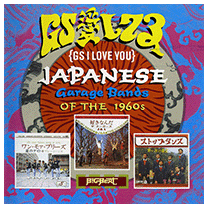 Various Artists "G.S. I LOVE YOU" (Ace-Big Beat Records, 1996)
Various Artists "G.S. I LOVE YOU" (Ace-Big Beat Records, 1996)
(Compiled by Nick Hopkins, Alec Palao & Toshi Nakamura)
A stunningly well-curated volume of Japanese garage rock and psychedelic beat from the '60s... Sometimes these sorts of "foreigners doing rock" collections are kitschy at best, but these two discs are flat-out goddamn awesome, full of both the big stars and some forgotten bands of Japan's 1960s "Group Sounds" garage-pop scene. This first volume is a bit more diverse, with more bands, though like the second set it concentrates on specific labels, probably because that's who the fab folks at Ace Records were in contact with at the time. Most of these artists recorded for either Crown Records or Union Records, and many of them only cut a few singles, while others were able to record full albums as well. Included here are tracks by The Burn, The Cougars, The Days & Nights, Out Cast, The Playboys, The Rangers, The Swing West, The Toys, The Van-Dogs and The Voltage, all of whom I'll try to profile separately, if I can. Perhaps most noteworthy are The Spiders (who have their own separate Ace/Big Beat collection) and Terry & The Blue Jeans, a foundational Japanese guitar band led by Takeshi Terauchi (1939-2021) who was more or less Japan's answer to Link Wray and Dick Dale. It's pretty amazing how hardcore and up-to-date some of these groups were, and how their legacies have lain dormant for so long. If you stumble upon either of these discs, don't ask questions -- just snap 'em up!
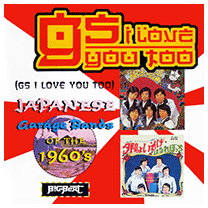 Various Artists "G.S. I LOVE YOU, TOO" (Ace-Big Beat Records, 1999)
Various Artists "G.S. I LOVE YOU, TOO" (Ace-Big Beat Records, 1999)
(Compiled by Alec Palao & Hitomi Omori)
A satisfying second volume that concentrates on a limited number of bands -- The Carnabeats, D'Swooners, Jaguars, Tempters, and The Youngers, with a couple of tracks by Lind & The Linders -- all of whom were signed to Philips Records. They seems to share a certain bright, clear production style (similar to other artists on Philips releases around the world) with solid, propulsive performances throughout. Several of these groups only released a handful of singles or EPs during the late 'Sixties, while the others also eked out a few LPs. Also, plenty of Japanese-language vocals, so yay for that. A solid archival set.
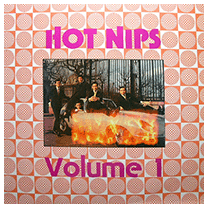 Various Artists "HOT NIPS, VOLUME 1" (Dolomite Records, 1998)
Various Artists "HOT NIPS, VOLUME 1" (Dolomite Records, 1998)
Despite the deliberately offensive album titles, these well-curated German bootleg reissue records stand firmly in the same collector-nerd sphere as the GS I Love You collections, which came out around the same time. Plenty of hard-rockin' golden oldies by bands such as the Bunnys, Dynamites, Golden Cups, Mops, Spiders and Outcast. Nice pacing, groovy song selection and some gnarly guitars... Though I often complain about the many group sound records that sang in English, this disc does a great job finding Japanese-language (and bilingual) gems from the late 'Sixties era. Highly recommended.
 Various Artists "HOT NIPS, VOLUME 2" (Dolomite Records, 1998)
Various Artists "HOT NIPS, VOLUME 2" (Dolomite Records, 1998)
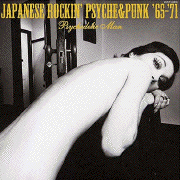 Various Artists "JAPANESE ROCKIN' PSYCHE & PUNK '65-71: PSYCHEDELIC MAN" (Toshiba-EMI, 2005)
Various Artists "JAPANESE ROCKIN' PSYCHE & PUNK '65-71: PSYCHEDELIC MAN" (Toshiba-EMI, 2005)
Various Artists "JAPANESE ROCKIN' PSYCHE & PUNK '65-71: HAPPENING AT 3 O'CLOCK AM" (Toshiba-EMI, 2005)
This is a pretty cool series, with plenty of real-deal, hardcore Japanese garage-psychedelic gems rescued from the shorelines of obscurity... The music is remarkably rugged and robust, with numerous Japanese bands full of the same energy and attitude as their snotty, brash contemporaries in the UK and USA. The sound quality's really good, too... Indeed, the only real drawback here is the lack of English-language liner notes, even, in most cases, the lack of non-Kanji song titles or artist names, which is pretty unusual for a Japanese reissue record. I guess the folks at EMI-Japan thought that no one outside of Japan would be interested in their old '60s rock records? Obviously they were wrong, but I'm still glad they put these records out. (There are at least three volumes I know about, two that I have, only one where I've been able to track down the song info...) Anyway, if you dig gnarly global retro-rock, and don't mind not knowing who the artists are, track these discs down.
 Various Artists "NIPPON ACID FOLK: 1970-1980" (Time Capsule Records, 2024)
Various Artists "NIPPON ACID FOLK: 1970-1980" (Time Capsule Records, 2024)
 Various Artists "NIPPON PSYCHEDELIC SOUL: 1970-1979" (Time Capsule Records, 2024)
Various Artists "NIPPON PSYCHEDELIC SOUL: 1970-1979" (Time Capsule Records, 2024)
Various Artists "TRIBUTE TO FLIPPER'S GUITAR: FRIENDS AGAIN" (Pastel Records, 2004)


Asian Music Index
World Music Index

 Apryl Fool "Apryl Fool" (Columbia Records, 1969) (LP)
Apryl Fool "Apryl Fool" (Columbia Records, 1969) (LP)

 Maki Asakawa "Asakawa Maki No Sekai" (Toshiba/Express Records, 1970) (LP)
Maki Asakawa "Asakawa Maki No Sekai" (Toshiba/Express Records, 1970) (LP)
 Maki Asakawa "Uramado" (Toshiba/Express Records, 1973) (LP)
Maki Asakawa "Uramado" (Toshiba/Express Records, 1973) (LP)
 Shinki Chen "...And His Friends" (Polydor-Japan, 1971) (LP)
Shinki Chen "...And His Friends" (Polydor-Japan, 1971) (LP)
 Cornelius "Fantasma" (Trattoria/Matador Records, 1997)
Cornelius "Fantasma" (Trattoria/Matador Records, 1997)
 Cornelius "Point: From Nakameguro To Everywhere" (Matador Records, 2002)
Cornelius "Point: From Nakameguro To Everywhere" (Matador Records, 2002)
 Miki Curtis & Samurai "Kappa" (Philips Records, 1971) (LP)
Miki Curtis & Samurai "Kappa" (Philips Records, 1971) (LP)
 Miki Curtis "The First Ear" (Vertigo Records, 1972) (LP)
Miki Curtis "The First Ear" (Vertigo Records, 1972) (LP)
 Kenji Endo "Niyago" (URC Records, 1970) (LP)
Kenji Endo "Niyago" (URC Records, 1970) (LP)
 Kenji Endo "Manzoku Dekiru Ka Na" (Polydor Records, 1971) (LP)
Kenji Endo "Manzoku Dekiru Ka Na" (Polydor Records, 1971) (LP)
 Kenji Endo "Nageki No Ukurere" (Polydor Records, 1972) (LP)
Kenji Endo "Nageki No Ukurere" (Polydor Records, 1972) (LP)
 Far Out "Nihonjin" (Denon Records, 1973) (LP)
Far Out "Nihonjin" (Denon Records, 1973) (LP)
 Far East Family Band "Nipponjin: Join Our Mental Phase Sound" (Vertigo Records, 1975) (LP)
Far East Family Band "Nipponjin: Join Our Mental Phase Sound" (Vertigo Records, 1975) (LP)
 Flipper's Guitar "Three Cheers For Our Side!" (Polystar/3D Records, 1989)
Flipper's Guitar "Three Cheers For Our Side!" (Polystar/3D Records, 1989)
 Flipper's Guitar "Camera Talk" (Polystar Records, 1990)
Flipper's Guitar "Camera Talk" (Polystar Records, 1990)
 (Yuya Uchida &) The Flowers "Challenge!" (Columbia Records, 1969) (LP)
(Yuya Uchida &) The Flowers "Challenge!" (Columbia Records, 1969) (LP)
 Flower Travellin' Band "Anywhere" (Philips-Japan, 1970) (LP)
Flower Travellin' Band "Anywhere" (Philips-Japan, 1970) (LP)
 Flower Travellin' Band "Satori" (Atlantic Records, 1971) (LP)
Flower Travellin' Band "Satori" (Atlantic Records, 1971) (LP)
 Flower Travellin' Band "Made In Japan" (Atlantic Records, 1972) (LP)
Flower Travellin' Band "Made In Japan" (Atlantic Records, 1972) (LP)
 Flower Travellin' Band "Make Up" (Atlantic Records, 1973) (LP)
Flower Travellin' Band "Make Up" (Atlantic Records, 1973) (LP)
 Fluid "Koito No Sekai" (Elec Records, 1972) (LP)
Fluid "Koito No Sekai" (Elec Records, 1972) (LP)
 Fluid "Orenji-Iro No Suke Tchi" (Elec Records, 1972) (LP)
Fluid "Orenji-Iro No Suke Tchi" (Elec Records, 1972) (LP)
 Food Brain "Social Gathering" (Polydor Records, 1970) (LP)
Food Brain "Social Gathering" (Polydor Records, 1970) (LP)
 Four Joe Half "Farther Longer/Motto Motto" (Denon Records, 1972) (LP)
Four Joe Half "Farther Longer/Motto Motto" (Denon Records, 1972) (LP)
 Four Joe Half "Urawa Rock Society 1972 Summer Camp" (Fuji Records, 2020) (LP)
Four Joe Half "Urawa Rock Society 1972 Summer Camp" (Fuji Records, 2020) (LP)
 Gypsy Blood "Rokko Oroshi" (Vertigo Records, 1972) (LP)
Gypsy Blood "Rokko Oroshi" (Vertigo Records, 1972) (LP)
 Hachimitsupai "Senchimentaru-Dori/Sentimental Street" (Bellwood Records, 1973) (LP)
Hachimitsupai "Senchimentaru-Dori/Sentimental Street" (Bellwood Records, 1973) (LP)
 Hachimitsupai "The Final Tapes: Live Box 1972-1974" (Super Fuji Discs, 2009) (LP)
Hachimitsupai "The Final Tapes: Live Box 1972-1974" (Super Fuji Discs, 2009) (LP)
 Happy End "Happy End" (Bellwood Records, 1973) (LP)
Happy End "Happy End" (Bellwood Records, 1973) (LP)
 Happy End "Raivu!/Live! Happy End, 1973.9.21" (Bellwood Records, 1974) (LP)
Happy End "Raivu!/Live! Happy End, 1973.9.21" (Bellwood Records, 1974) (LP)
 Fujiwara Hideko "Watashi No Burusu/My Blues" (URC Records, 1970) (LP)
Fujiwara Hideko "Watashi No Burusu/My Blues" (URC Records, 1970) (LP)
 Haruomi Hosono "Hosono House" (King Records-Japan, 1973) (LP)
Haruomi Hosono "Hosono House" (King Records-Japan, 1973) (LP)
 Yosui Inoue "Danzetsu" (Polydor Records, 1972) (LP)
Yosui Inoue "Danzetsu" (Polydor Records, 1972) (LP)
 Yosui Inoue "Yosui II: Sentimental" (Polydor Records, 1973) (LP)
Yosui Inoue "Yosui II: Sentimental" (Polydor Records, 1973) (LP)
 Yosui Inoue "Yosui Live" (Polydor Records, 1973) (LP)
Yosui Inoue "Yosui Live" (Polydor Records, 1973) (LP)
 Yosui Inoue "Nishokunokoma" (Polydor Records, 1974) (LP)
Yosui Inoue "Nishokunokoma" (Polydor Records, 1974) (LP)
 Hideki Ishima "One Day" (Propeller Records, 1973) (LP)
Hideki Ishima "One Day" (Propeller Records, 1973) (LP)
 Itsutsu No Akai Fusen "Oto Gibanashi/Fairy Tale" (URC Records, 1969) (LP)
Itsutsu No Akai Fusen "Oto Gibanashi/Fairy Tale" (URC Records, 1969) (LP)
 Kaguyahime "Kaguyahime 3" (Panam Records, 1973) (LP)
Kaguyahime "Kaguyahime 3" (Panam Records, 1973) (LP)
 Sachiko Kanenobu "Misora/Sky" (URC Records, 1972) (LP)
Sachiko Kanenobu "Misora/Sky" (URC Records, 1972) (LP)
 Chu Kosaka "Arigato" (Mushroom Records, 1971) (LP)
Chu Kosaka "Arigato" (Mushroom Records, 1971) (LP)
 The Mannheim Rock Ensemble "Rock Of Joy" (Columbia Records, 1971) (LP)
The Mannheim Rock Ensemble "Rock Of Joy" (Columbia Records, 1971) (LP)
 Mao "One For Elton John" (Denon Records, 1971) (LP)
Mao "One For Elton John" (Denon Records, 1971) (LP)
 Mao "Call On Me" (Liberty Records, 1972) (LP)
Mao "Call On Me" (Liberty Records, 1972) (LP)
 The Mops "Psychedelic Sounds In Japan" (Victor Records-Japan, 1968) (LP)
The Mops "Psychedelic Sounds In Japan" (Victor Records-Japan, 1968) (LP)
 The Mops "Rock'N'Roll '70" (Liberty Records, 1970) (LP)
The Mops "Rock'N'Roll '70" (Liberty Records, 1970) (LP)
 The Mops "Iijanaika" (Liberty Records, 1971) (LP)
The Mops "Iijanaika" (Liberty Records, 1971) (LP)
 The Mops "Kaminari Mai" (Liberty Records, 1971) (LP)
The Mops "Kaminari Mai" (Liberty Records, 1971) (LP)
 The Mops "Exit" (Liberty Records, 1974) (LP)
The Mops "Exit" (Liberty Records, 1974) (LP)
 Takashi Nishioka "Maninnoki" (URC Records, 1973) (LP)
Takashi Nishioka "Maninnoki" (URC Records, 1973) (LP)
 Maki Nomiya "Pinku No Kokoro/Pink Heart" (Flying Dog Records, 1981) (LP)
Maki Nomiya "Pinku No Kokoro/Pink Heart" (Flying Dog Records, 1981) (LP)
 Nobuyasu Okabayashi "Tomoyo/ My Friend" (URC Records, 1969) (LP)
Nobuyasu Okabayashi "Tomoyo/ My Friend" (URC Records, 1969) (LP)
 People "Ceremony: Buddha Meet Rock" (Teichiku Records, 1971) (LP)
People "Ceremony: Buddha Meet Rock" (Teichiku Records, 1971) (LP)
 Pizzicato Five "Happy End Of The World" (Matador Records, 1997)
Pizzicato Five "Happy End Of The World" (Matador Records, 1997)
 Portable Rock "Q. T." (Japan Records, 1985)
Portable Rock "Q. T." (Japan Records, 1985)
 Pyg "Pyg! Original First Album" (Polydor Records, 1971) (LP)
Pyg "Pyg! Original First Album" (Polydor Records, 1971) (LP)
 Pyg "Free With Pyg: Pyg Live In Colosseum" (Polydor Records, 1971) (LP)
Pyg "Free With Pyg: Pyg Live In Colosseum" (Polydor Records, 1971) (LP)
 Ryukyu Underground "Ryukyu Underground" (Riverboat/Respect Records, 2002)
Ryukyu Underground "Ryukyu Underground" (Riverboat/Respect Records, 2002)
 Salon Music "My Girl Friday" (Canyon Records, 1983)
Salon Music "My Girl Friday" (Canyon Records, 1983)
 Salon Music "La Paloma Show" (Canyon Records, 1984)
Salon Music "La Paloma Show" (Canyon Records, 1984)
 Seagull Screaming Kiss Her, Kiss Her "Pink Soda" (EP) (Polystar-Japan, 1996)
Seagull Screaming Kiss Her, Kiss Her "Pink Soda" (EP) (Polystar-Japan, 1996)
 Hiroshi Segawa "Pierrot" (Propeller Records, 1972) (LP)
Hiroshi Segawa "Pierrot" (Propeller Records, 1972) (LP)
 Sons Of Sun "Kaizoku Kiddo No Boken" (Victor Records, 1972) (LP)
Sons Of Sun "Kaizoku Kiddo No Boken" (Victor Records, 1972) (LP)
 Speed, Glue & Shinki "Eve" (Atlantic Records, 1971) (LP)
Speed, Glue & Shinki "Eve" (Atlantic Records, 1971) (LP)
 Speed, Glue & Shinki "Eve" (Atlantic Records, 1972) (LP)
Speed, Glue & Shinki "Eve" (Atlantic Records, 1972) (LP)
 The Spiders "GS I Love You, Volume Three: Let's Go Spiders!" (Ace/Big Beat Records, 2000)
The Spiders "GS I Love You, Volume Three: Let's Go Spiders!" (Ace/Big Beat Records, 2000)
 Strawberry Path "When The Raven Has Come To The Earth" (Philips Records, 1971) (LP)
Strawberry Path "When The Raven Has Come To The Earth" (Philips Records, 1971) (LP)
 Hiruomitsu Suzuki "Eternal Reincarnation" (Express Records, 1976) (LP)
Hiruomitsu Suzuki "Eternal Reincarnation" (Express Records, 1976) (LP)
 Takeshi Terauchi "Nippon Guitars: Instrumental Surf, Eleki & Tsugaru Rock, 1966-1974" (Ace/Big Beat Records, 2011)
Takeshi Terauchi "Nippon Guitars: Instrumental Surf, Eleki & Tsugaru Rock, 1966-1974" (Ace/Big Beat Records, 2011)
 The Tigers "On Stage" (Polydor Records, 1967) (LP)
The Tigers "On Stage" (Polydor Records, 1967) (LP)
 Tokedashita Garasubako "Tokedashita Garasubako/Melted Glass Box" (URC Records, 1970) (LP)
Tokedashita Garasubako "Tokedashita Garasubako/Melted Glass Box" (URC Records, 1970) (LP)
 Vodka Collins "Tokyo New York" (Express Records, 1973) (LP)
Vodka Collins "Tokyo New York" (Express Records, 1973) (LP)
 The Voltage "R&B Big Hits Album" (Union Records, 1968) (LP)
The Voltage "R&B Big Hits Album" (Union Records, 1968) (LP)
 Hiro Yanagida "Milk Time" (Liberty Records, 1970) (LP)
Hiro Yanagida "Milk Time" (Liberty Records, 1970) (LP)
 Hiro Yanagida "Hiro Yanagida" (Atlantic Records, 1971) (LP)
Hiro Yanagida "Hiro Yanagida" (Atlantic Records, 1971) (LP)
 Hiro Yanagida "Hiro" (URC Records, 1972) (LP)
Hiro Yanagida "Hiro" (URC Records, 1972) (LP)
 Hiro Yanagida "Hirocosmos" (CBS Records, 1973) (LP)
Hiro Yanagida "Hirocosmos" (CBS Records, 1973) (LP)
 Daisaku Yoshino "Daisaku Yoshino's Childhood" (1973) (LP)
Daisaku Yoshino "Daisaku Yoshino's Childhood" (1973) (LP)
 Daisaku Yoshino "Lamp Factory" (1974) (LP)
Daisaku Yoshino "Lamp Factory" (1974) (LP)
 Yuigon Uta "Darenimo Shira Rezu Ni Kieru Shika Nai Sa" (Philips Records, 1971) (LP)
Yuigon Uta "Darenimo Shira Rezu Ni Kieru Shika Nai Sa" (Philips Records, 1971) (LP)
 Various Artists "THE CULT G. S. -- THE COMPLETE SINGLES" (Teichiku Entertainment, 2000)
Various Artists "THE CULT G. S. -- THE COMPLETE SINGLES" (Teichiku Entertainment, 2000)
 Various Artists "G.S. I LOVE YOU" (Ace-Big Beat Records, 1996)
Various Artists "G.S. I LOVE YOU" (Ace-Big Beat Records, 1996)
 Various Artists "G.S. I LOVE YOU, TOO" (Ace-Big Beat Records, 1999)
Various Artists "G.S. I LOVE YOU, TOO" (Ace-Big Beat Records, 1999)
 Various Artists "HOT NIPS, VOLUME 1" (Dolomite Records, 1998)
Various Artists "HOT NIPS, VOLUME 1" (Dolomite Records, 1998)
 Various Artists "JAPANESE ROCKIN' PSYCHE & PUNK '65-71: PSYCHEDELIC MAN" (Toshiba-EMI, 2005)
Various Artists "JAPANESE ROCKIN' PSYCHE & PUNK '65-71: PSYCHEDELIC MAN" (Toshiba-EMI, 2005)


